
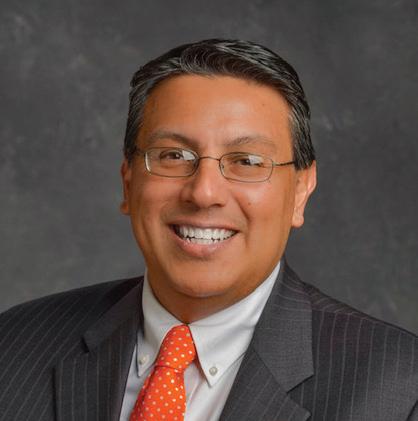
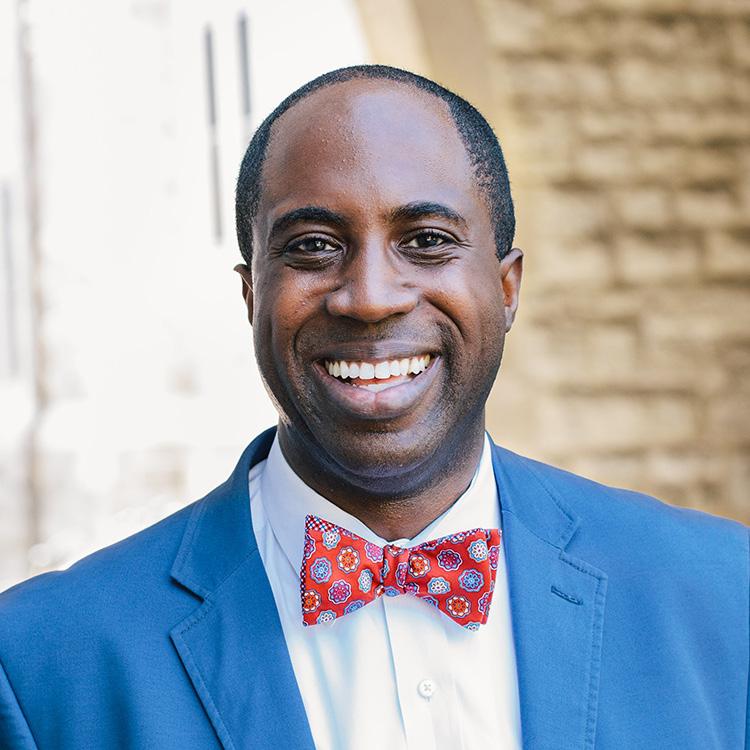
The Division of Student Life is comprised of 19 departments and more than 430 staff. Every single one of those individuals has an impact on the student experience at the University of Tennessee. By pursuing creative solutions to complex problems, like an AI-driven help bot for student tickets for athletic events and a comprehensive guide to help event organizers on campus, the division continues to excel and lead in developing a rewarding collegiate experience for all Vols.
The experiences offered by the division support student growth and propel them into fulfilling careers positioned as thought leaders and innovators in their fields. Four student stories are shared herein illustrating the breadth and diversity of opportunities available through the division in the areas of career readiness and professionalism.
We are also expanding how we invite students and staff to explore personal growth, from cohort experiences to community service opportunities that stretch horizons and inspire thoughtful reflection.
Our commitment to providing excellent care to the student body also persists, with telling results from a reaccreditation process and alcohol education initiatives. Promoting health, well-being, and an accessible experience for the entire campus community is at the core of who we are.
We are so pleased to share some of the personal stories that represent our collective work, and we hope you enjoy reading about our successes and collaborations.
In the Volunteer spirit,
 Frank Cuevas Vice Chancellor for Student Life
Frank Cuevas Vice Chancellor for Student Life
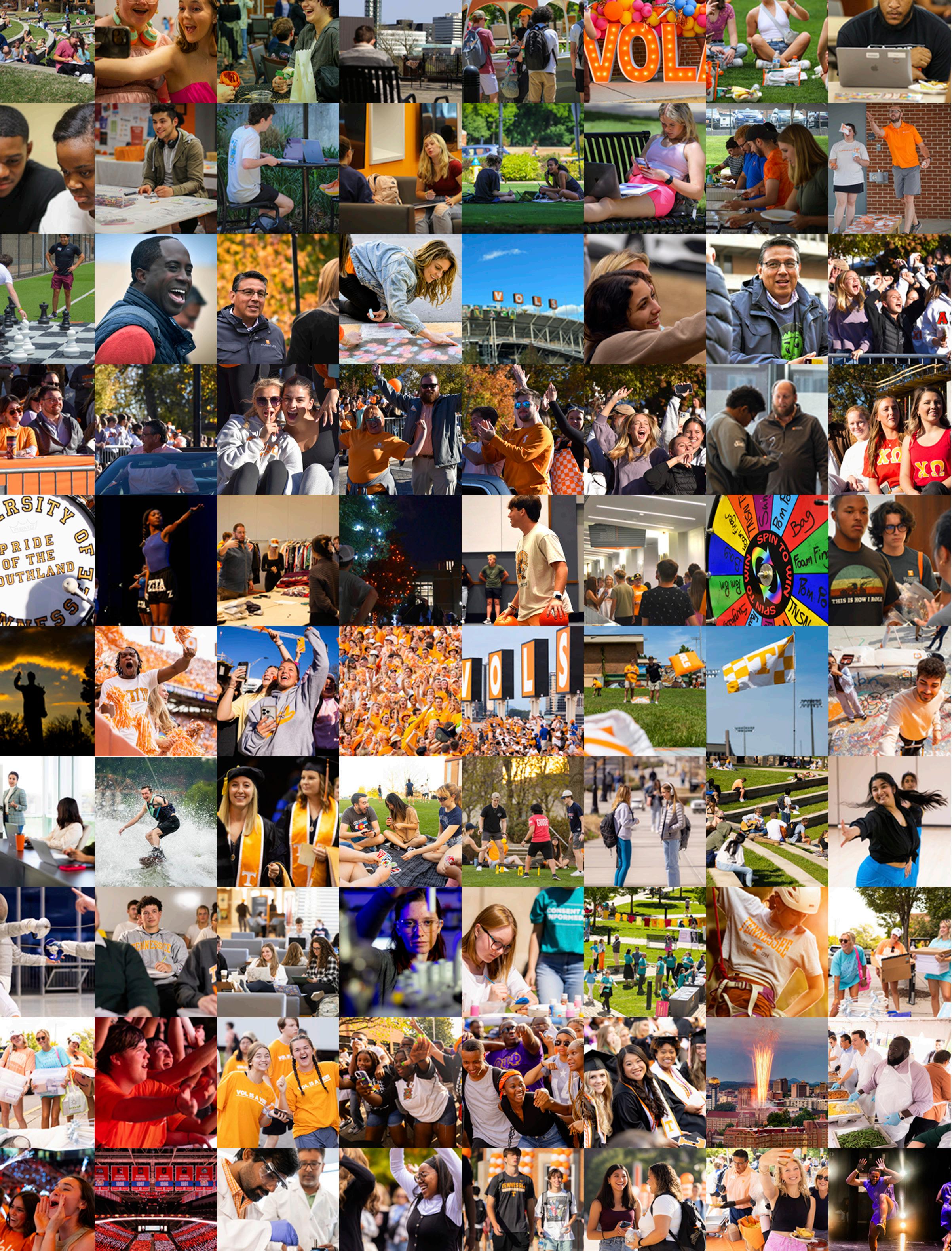 Byron Hughes Assistant Vice Chancellor and Dean of Students
Byron Hughes Assistant Vice Chancellor and Dean of Students
2
Letter from Student Life Leadership 2 Table of Contents 3 We Are Student Life 4 Priority 1: Transformative Experiences 6 An Unlikely Campus Connection Yields a New Friendship 8 Not Here. Not Now. Hazing Prevention Ehances Experience on Rocky Top 12 Second Annual Pack to Give Back Supports Clothing Access for Students 16 Everyone Needs a Cobi in Their Life 20 Priority 2: Culture of Inclusivity and Care 24 Two-Pronged Approach to Alcohol Education to Support Healthier Decisions On Campus 26 Feelin’ Fine: Tennessee’s Only Accredited Student Health Center Sets the Standard for Best Practice 28 New Inclusive Excellence Program Guide Supports Access for All 34 Priority 3: Personal and Professional Growth 36 Lunch is Served: New Staff Initiative Combines Food and Fellowship in Unique Way 38 Center for Student Engagement: A Career Launchpad for the Competitive Entertainment Industry 40 Growing in My Leadership Skills, a Director’s Perspective 42 Professional Fellowship Adopts New Model and Incorporates Designing Your Life Principles 44 Priority 4: Responsible and Effective Stewardship 46 Grinding Forward: Young Alumnus Invests in Future of Multicultural Student Life 48 Student Employment Experience with Basic Needs Leads to New Skills 50 Lending a Digital Paw: A New Virtual Version of Smokey is Helping Students Get Answers, Fast 52 TABLE OF CONTENTS EXECUTIVE EDITOR Meghan Jagnow ART DIRECTOR Patrick Lamb MANAGING EDITOR Beth Hall Davis CONTRIBUTING EDITORS Landin Lynd Chandra Myrick SPECIAL THANKS TO Steven Bridges Melissa Brown Noelia Pacheco-Diaz Lauri Dusselier Hailey Flavin Anthony de leon Matta Cole Moore McKenzie Rider University Printing & Mail The University of Tennessee is an EEO/AA/Title VI/Title IX/Section 504/ADA/ADEA institution in the provision of its education and employment programs and services. All qualified applicants will receive equal consideration for employment and admission without regard to race, color, national origin, religion, sex, pregnancy, marital status, sexual orientation, gender identity, age, physical or mental disability, genetic information, veteran status, and parental status. A project of the Division of Student Life. PAN E01-0208-001-23
WE ARE STUDENT LIFE.
WE ARE UT.
We create transformative opportunities for students to learn and grow outside of the classroom. We connect with community partners to engage students in service, giving back to our local and global community. We invest in physical spaces where students live and work to create a home away from home. We value personal and community well-being by providing unique opportunities to find the balance students need to be their best at UT.
We are the student advocate, the mentor that develops the emerging leader, and the support that students lean on in time of need. We cultivate the Volunteer experience every day through our programs, spaces, and resources.
4

5

PRIORITY 1 Transformative Experiences
The Division of Student Life provides opportunities for students to develop a sense of self by understanding their individual strengths, values, and goals, and expanding their leadership capacity. We empower students to connect with the broader community through civic engagement and enhance the overall campus experience by providing services and programs to students.
6
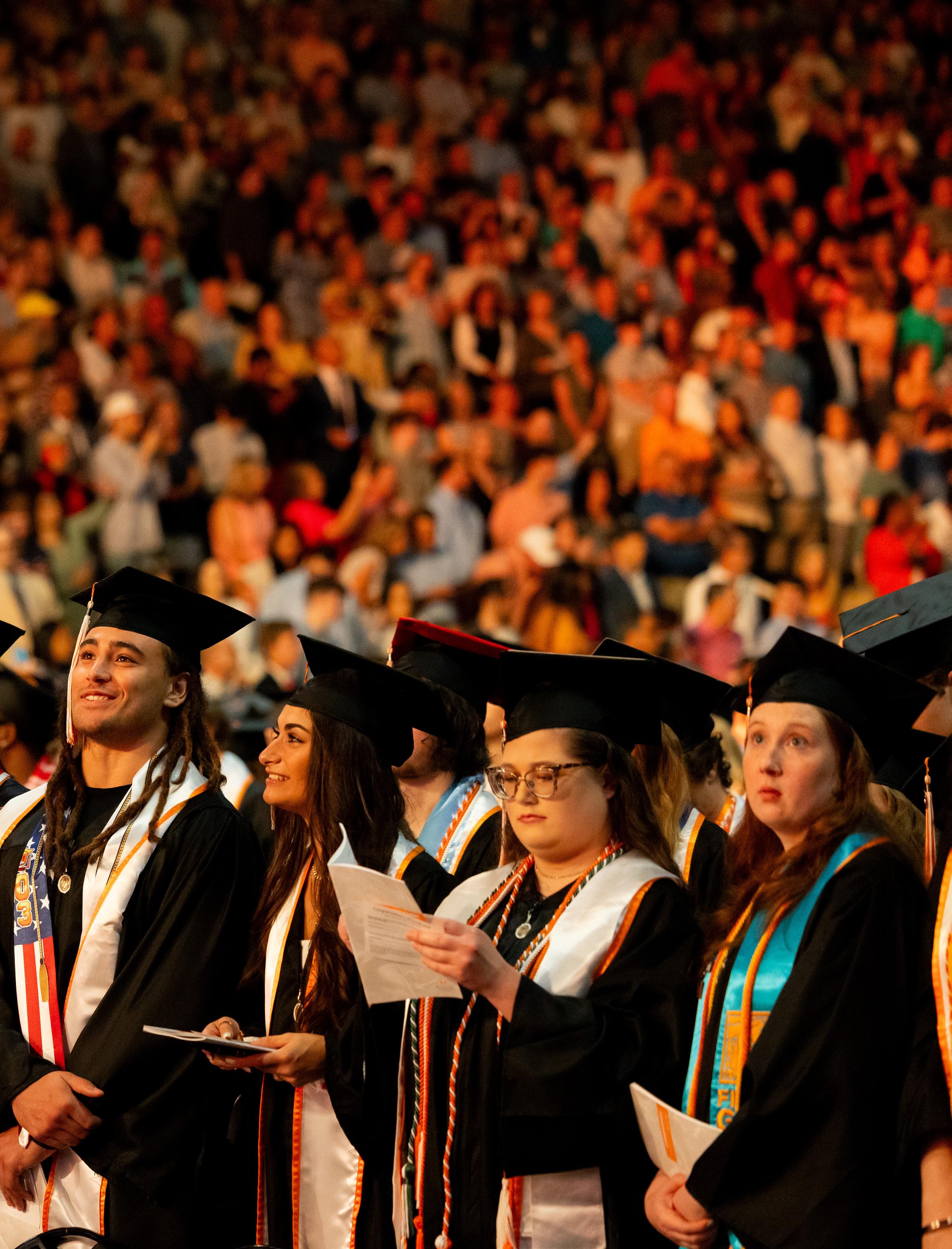
7
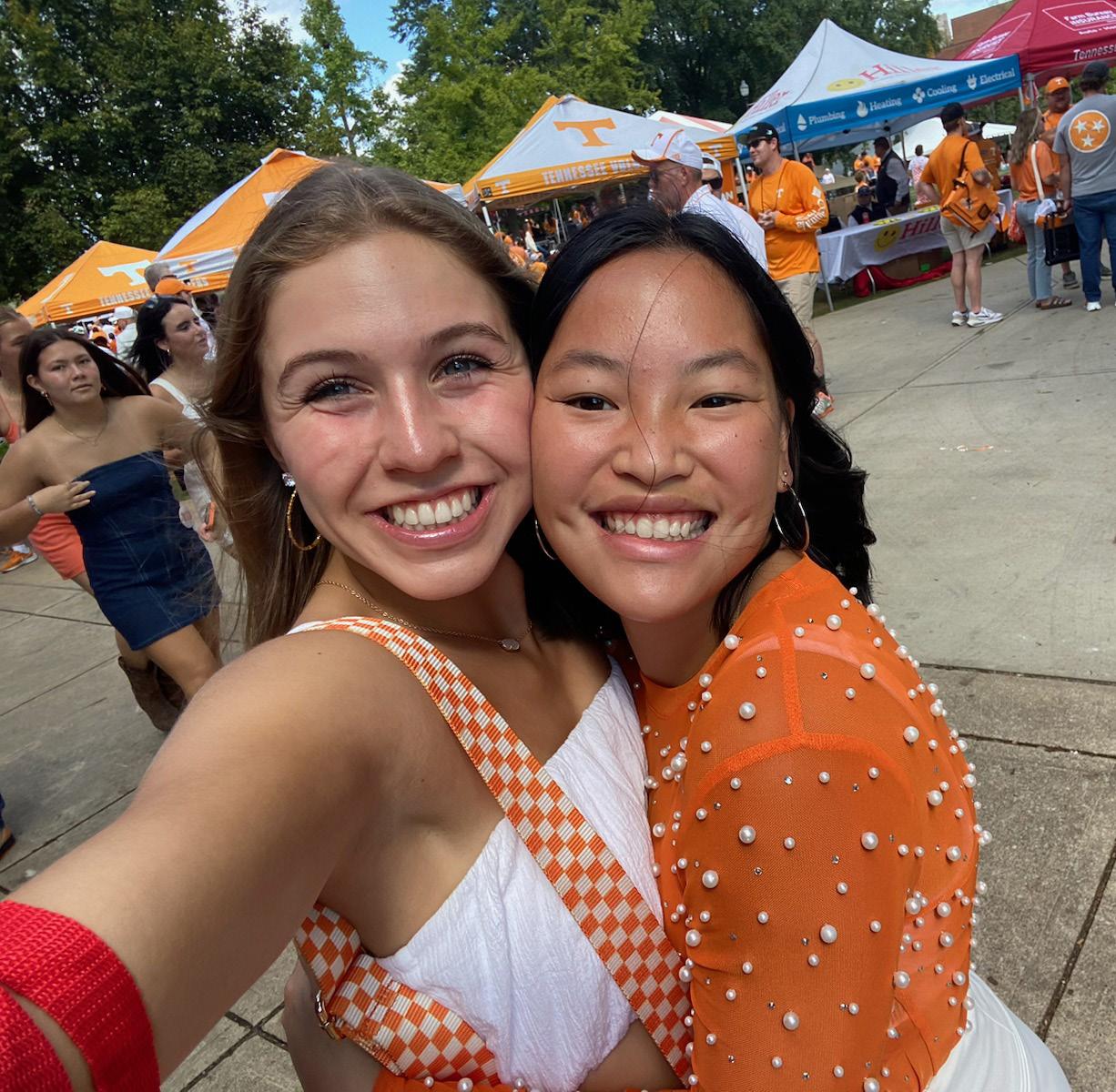
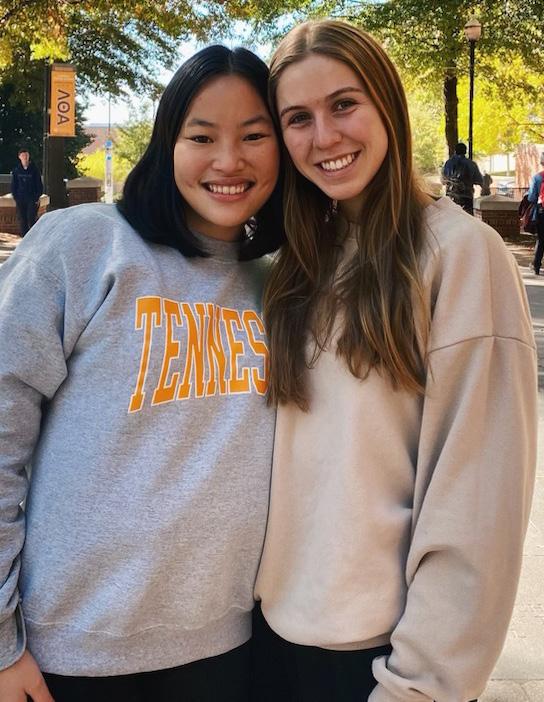
8
Sam Elliott (l), Madi Rogers (r)
An Unlikely Campus Connection Yields a
NEW FRIENDSHIP
With more than 36,000 students, it can feel like a daunting task for a student to find where they fit on campus at the University of Tennessee. But for first-year student Madi Rogers, her Volunteer experience has been filled with connection from the very beginning.
Rogers signed up for a housing tour as a prospective student and was guided on campus by Sam Elliott, a Vols@Home tour guide with University Housing.
“I came to campus in March 2023 for a housing tour as I was really torn on which university to attend,” said Rogers. “I was seeing what would fit me best, and Sam gave me the best advice and shared a great outlook on the opportunities and experiences everyone loves at UT.”
A nursing major who will graduate in spring 2026, Elliott is in her second year of serving with the Vols@ Home program that provides housing tours to prospective students in a small-group, peerled setting.
“I’m a social person so she knew I would do well there.”
Fast forward to August when Rogers attended Ignite, a premier program at UT that welcomes incoming students to campus. Participating in Ignite helps students transition to Rocky Top and facilitates community service experiences to promote social, personal, and leadership success for new Vols’ first year at UT.
Lo and behold, one of Rogers’ team leaders for Ignite was Elliott.
“
“Sam was one of the first people I saw when I walked in, and she was one of my team leaders,” said Rogers. “She was my first person, my first introduction to the real experiences at Tennessee. She made my first experience at Tennessee unforgettable.”
“The people here are why I came to Tennessee.”
“When you’re leading ambassador tours you’re giving tours to 50 people at once, but housing is more personal,” said Elliott. “That’s why Madi and I got along so well. It was just me, her, and her parents. Some tours aren’t as great as others, but we hit it off right off the bat.”
“She showed me Tennessee is where I needed to be,” added Rogers. She noted that everyone seemed to love it at UT, and Elliott was no exception.
“She gave a glowing review of UT and recommended I live in Hess Hall which is so communal,” says Rogers.
“For her to be in my group at Ignite, what are the odds?” asked Elliott. “In my Ignite group when I was a first-year student, I was the only person from Tennessee. It was so eye-opening to hear other people’s perspectives. That’s why I became an Ignite team leader—it’s such a great way to dive in and be a leader on such a big campus. I seriously felt the magic and energy of Ignite.”
Elliott shared that in her experience it was intimidating to come to such a big school, but having an experience like Ignite where she could dive in and get to know other people and people from different backgrounds made her transition to campus much smoother.
“By the end of Ignite, strangers are your best friends,” said Elliott. “You build connections with
PRIORITY 1
—Madi Rogers ” 9
upperclassmen, and you build connections within yourself as you find out who you are as an individual. We dig into deep topics to discover your own values and strengths.
“By the end of Ignite, strangers are your best friends.”
“ ”
For me, as a team leader, I love that I still have this connection with Madi. I’m not her mentor any more—now we’re on the same playing field.”
Rogers shared that Elliott helped her get organized the first couple weeks of school and having connections like that on campus made her fall semester and overall adjustment to college so much easier.
“The people here are why I came to Tennessee,” added Rogers.
“For Madi and I to be strangers on that housing tour and then dive into friendship at Ignite has just been the best thing in the world,” added Elliott. “She’s in a sorority with my roommate and we usually talk about once a week. We have a lot in common and see each other on campus often.”
For Elliott and Rogers, the campus community is amazing. Even though it’s such a big school, everyone is connected. According to Elliott, “I have a connection of some kind with everyone.”
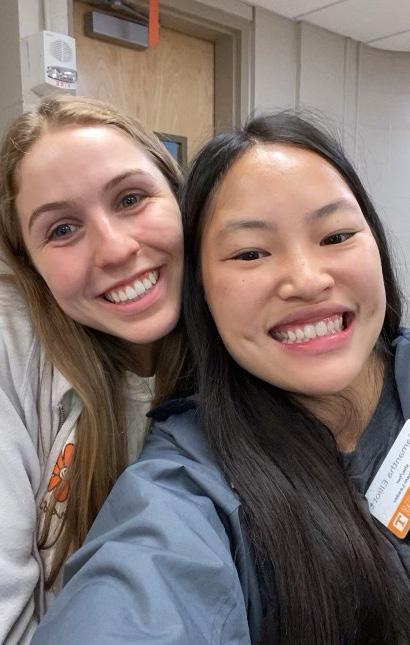
—Sam Elliott 10
IGNITE
by the numbers:
In 2023, 648 first-year students participated in Ignite. Ignite is in its 23rd year on campus.
In 2023, Ignite participants completed 1,091 combined community service hours.
For Ignite participants, 96% communicated an increased sense of community and belonging following the program.
VOLS@HOME
by the numbers:
Each semester, 10–12 students provide housing tours to individual first-year students and their families, allowing for a deeper connection and greater space to answer any questions they may have.
Students and families may choose up to five residence halls to view and get to explore each of the different housing styles available.
For the 2023–2024 academic year, University Housing supported
8,700 on-campus residents
190 resident assistants (RAs)
440 total student staff
70 graduate assistants and professional staff
150 maintenance and custodial staff
11
NOT HERE. NOT NOW.
Hazing Prevention Enhances Engagement on Rocky Top
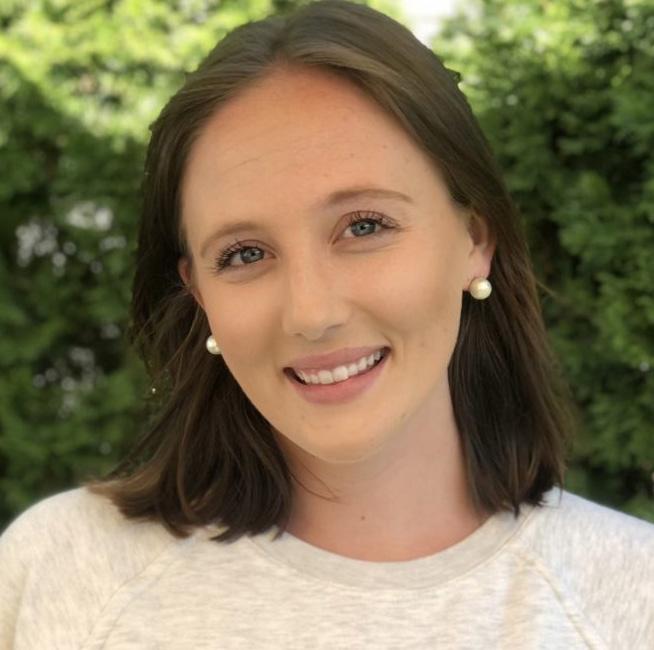 Hailey Flavin
Assistant Director, Office of Sorority and Fraternity Life
Hailey Flavin
Assistant Director, Office of Sorority and Fraternity Life
Hazing has no place at the University of Tennessee.
According to a national study of student hazing experiences1, hazing is a big problem nationwide with 55% of college students having been hazed. However, 9 out of 10 people don’t realize that they are being hazed and 95% of those who were aware they were being hazed did not report it.
Because of this, UT’s Hazing Prevention Team works collaboratively to educate the campus community on how to identify, act on, and prevent hazing. The team is made up of campus partners from many areas of UT who all share the same goal: eliminate hazing completely.
Hazing can be any activity that endangers someone’s mental or physical health/ safety or coerces someone to endanger their mental or physical health/safety. Even if someone is willing to participate in an activity, if it endangers their wellbeing and meets the definition, it’s still hazing.

1Allan, E. J., & Madden, M. (n.d.). Hazing in view: College students at risk. https://stophazing.org/wp-content/uploads/2020/12/hazing_in_view_study.pdf 12
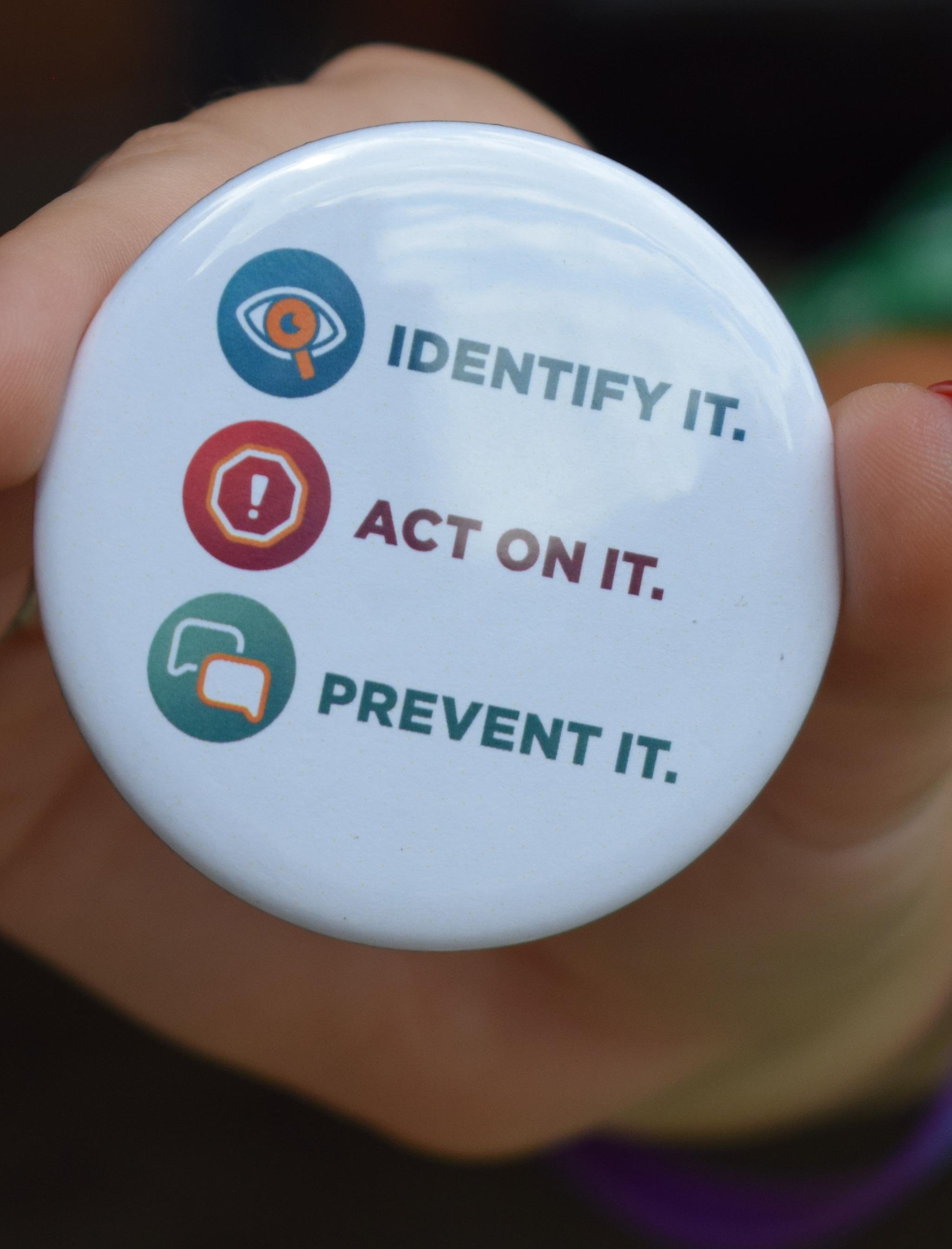
PRIORITY 1 13
The Division of Student Life’s strategic plan prioritizes caring for all Vols. Part of this care is ensuring that students have a healthy involvement experience that aligns with the values of the university. One aspect of the Hazing Prevention Team’s role is to facilitate National Hazing Prevention Week which occurred from September 25–29 this past fall.
Throughout Hazing Prevention Week, the team hosted a plethora of events for students. More than 200 people joined the Hazing Prevention passport event in the 21st Mortgage Plaza at the Student Union to walk through different activities to learn more about how to identify hazing, what to do when you see it, and how to prevent hazing on campus.
Tables were strategically located on Pedestrian Walkway throughout the week to get resources related to hazing prevention into the hands of students, with more than 200 students stopping to chat with team members.
Faculty, staff, and student leaders from organizations across campus joined the Hazing Prevention Team for an educational workshop on hazing prevention training. Over 60 faculty and staff joined the session, leaving equipped with the tools necessary to identify when a student may be experiencing hazing and to report it to campus authorities.
Together with the Center for Health Education and Wellness, the team hosted 212 students for VolsACT Day, which focused on educating students on how to be an active bystander.
Students in various campus organizations were also invited to sign a banner that says “We’re Committed,” signifying their commitment to end hazing at UT. Students signed the banner at events throughout the week, and then the banner was displayed at the Student Union when the week concluded, reminding students of their commitment.
Anyone who has experienced or witnessed hazing can report it online at hazingprevention.utk.edu or studentconduct.utk.edu.
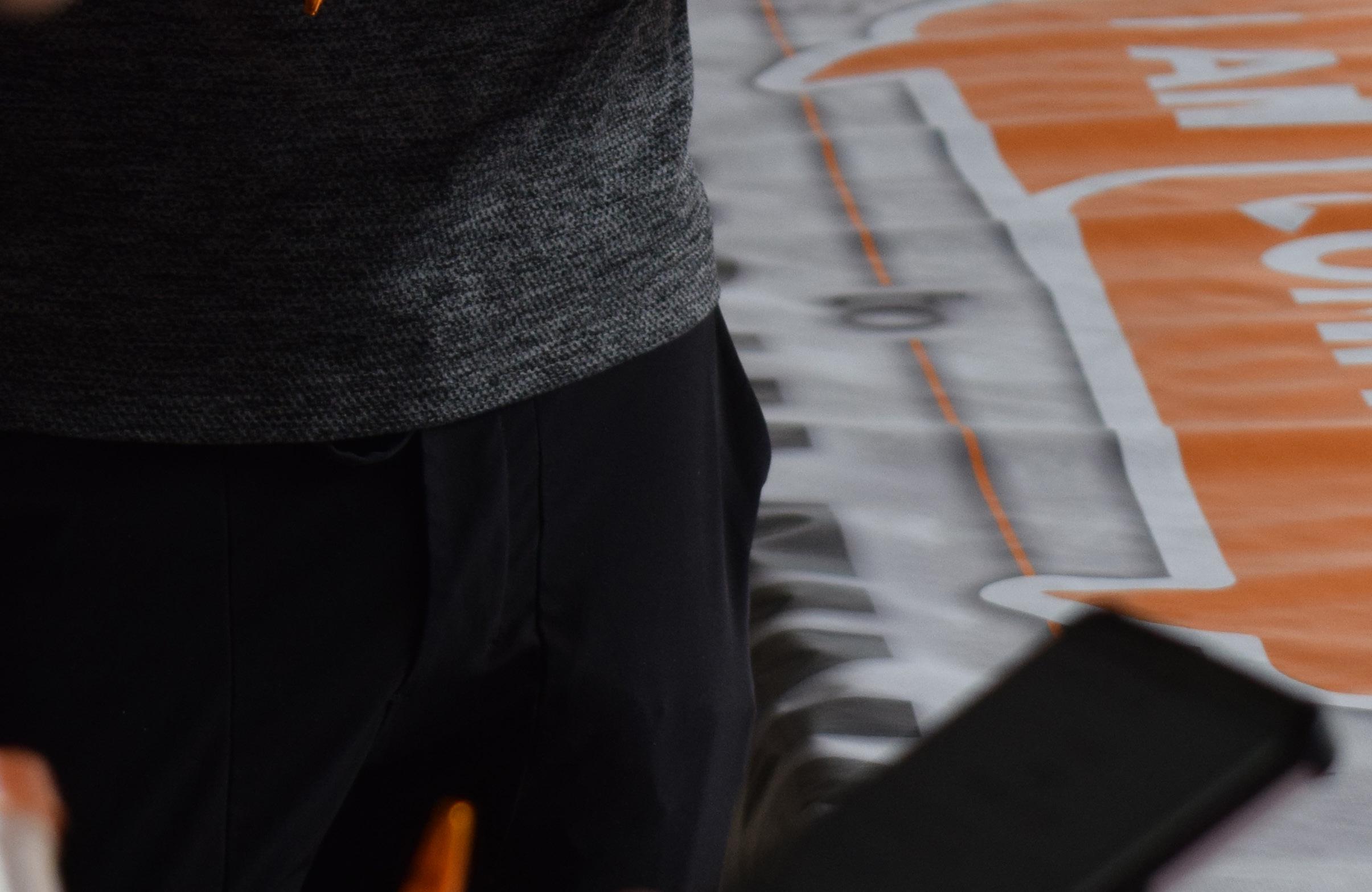
14
What students are saying about Hazing Prevention Week
““Hazing Prevention Week is important because it exposes students to various scenarios that are considered hazing so that they can recognize hazing and take action by using the resources provided on campus.”
—Siedah Buckley Class of 2025
“Hazing Prevention Week is important, not only because of the many resources it provides to students from all corners of campus, but because of its display of commitment to improving the UT experience and fighting against hazing.”
—Harrison Van Eaton Class of 2024
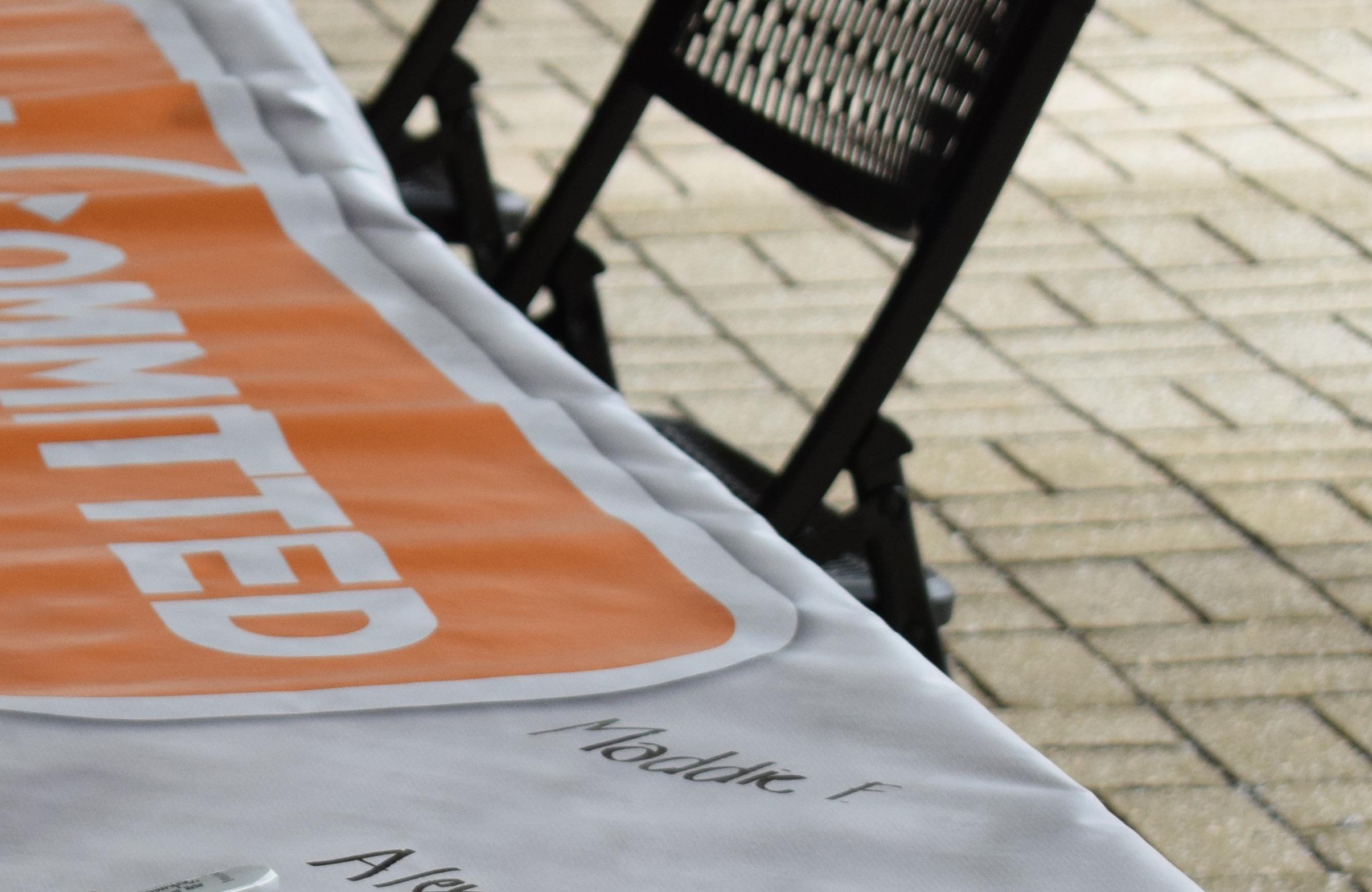
“Hazing Prevention Week is a time for students, faculty, and staff to come together and learn the dangers of hazing, promote awareness, and encourage our communities to unite against harmful practices.”
Claire Shamiyeh Class of 2024
”
“ ”
15
“ ”

PACK (HANG, SORT) TO GIVE BACK
16
Second Annual Pack to Give Back Supports Clothing Access for Students
Pack to Give Back is an annual service opportunity for students, faculty, and staff to engage with one another and give back to their community in strategic ways, meeting the basic needs of students and creating tangible impacts.
Hosted jointly, last fall’s Pack to Give Back event was a partnership between UT’s Office of Sustainability and the Free Store, the Office of the Dean of Students, and the Jones Center for Leadership and Service.
Primarily an effort to support student basic needs, the volunteer event collected more than 2,000 articles of donated clothing with an estimated value of over $10,000. More than 150 student volunteers and 25 total staff, faculty, and alumni volunteers joined together to complete the considerable task of sorting, measuring, tagging, steam cleaning, and organizing the clothing items.
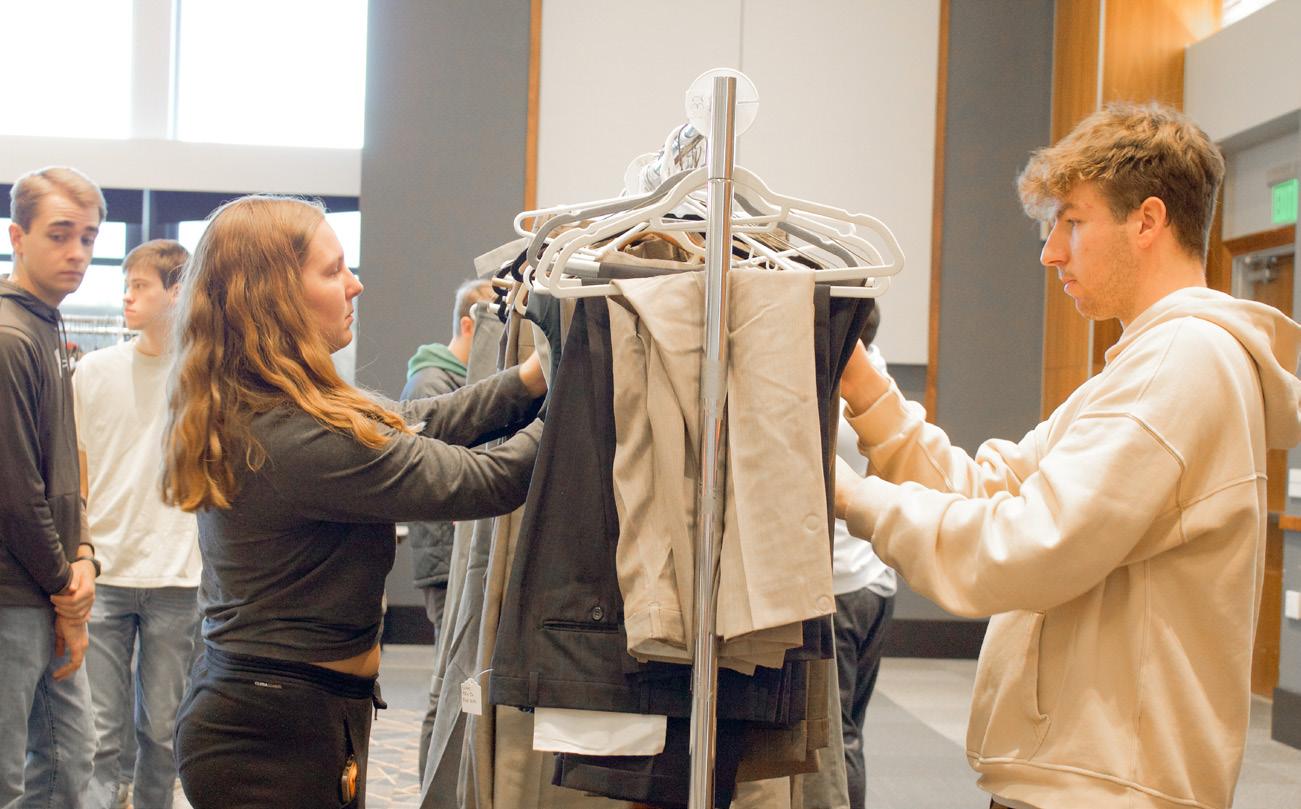
“
“Service opportunities like these allow our students to understand how they make a real impact on the community around them.”
Smokey’s Closet was the final destination for 75% of the donated items, with the other 25% distributed to the Free Store. Both of these campus resources supply students with free clothing items for a variety of needs, including professional clothing for job interviews and career fairs.
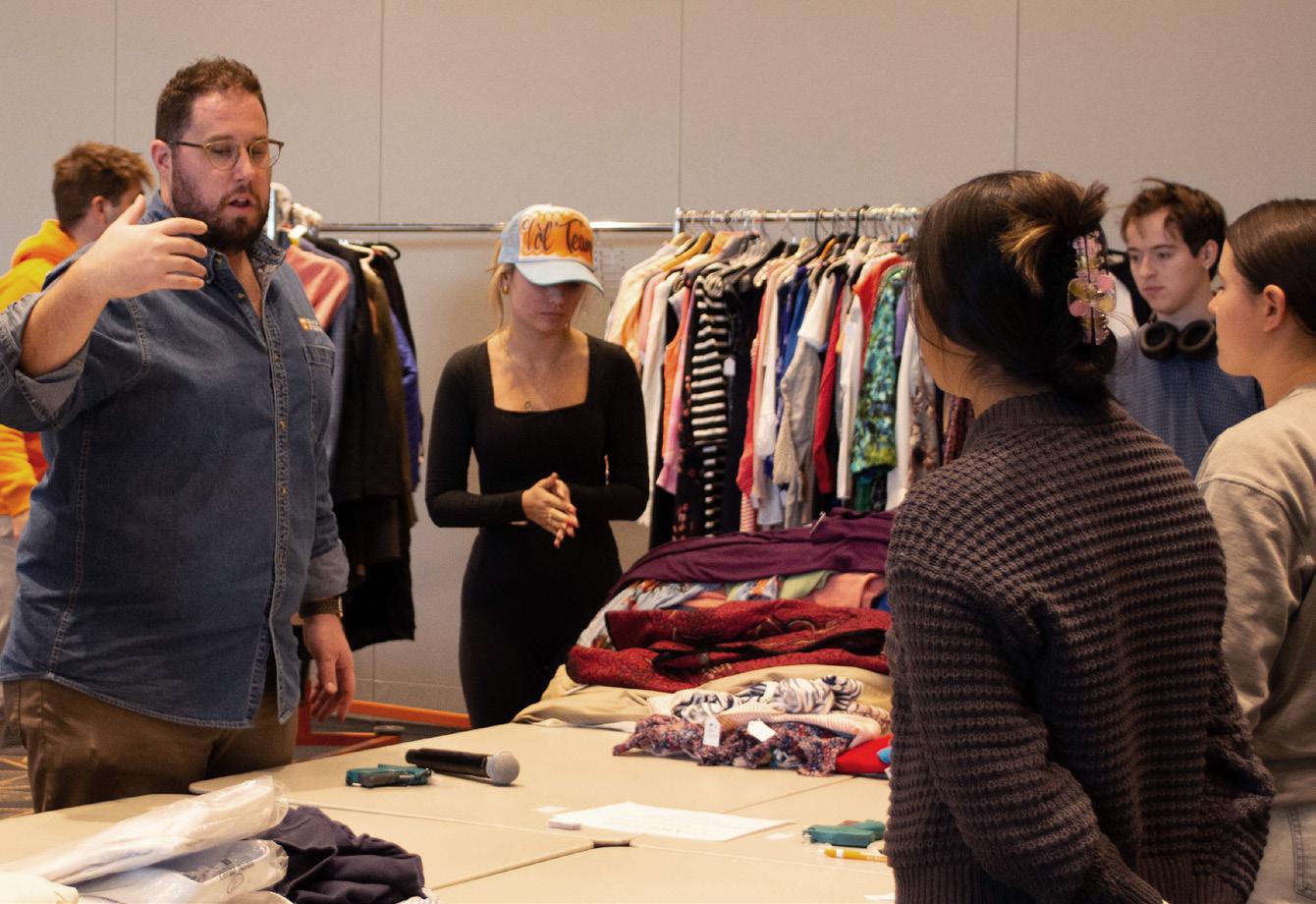
—Byron Hughes
“Service opportunities like these allow our students to understand how they make a real impact on the community around them,” said Byron Hughes, assistant vice chancellor and dean of students. “We appreciate creating transformative experiences where students can connect their strengths and passion with the needs of society in the Volunteer Spirit!”
Pack to Give Back participants learned about sustainability efforts, basic needs resources, and the importance of reducing clothing waste. After each volunteer shift, participants also engaged in reflection led by the Jones Center ambassadors. Participants were asked to reflect on and discuss what motivated them to sign up to volunteer at the event and why Smokey’s Closet exists. Participants also reflected on other ways to contribute to campus and the larger community and aspects of the service experience that they felt will remain with them as part of their Volunteer experience.
” PRIORITY 1 17
More than 2,000 articles of clothing, with an estimated value of more than $10,000, were donated.
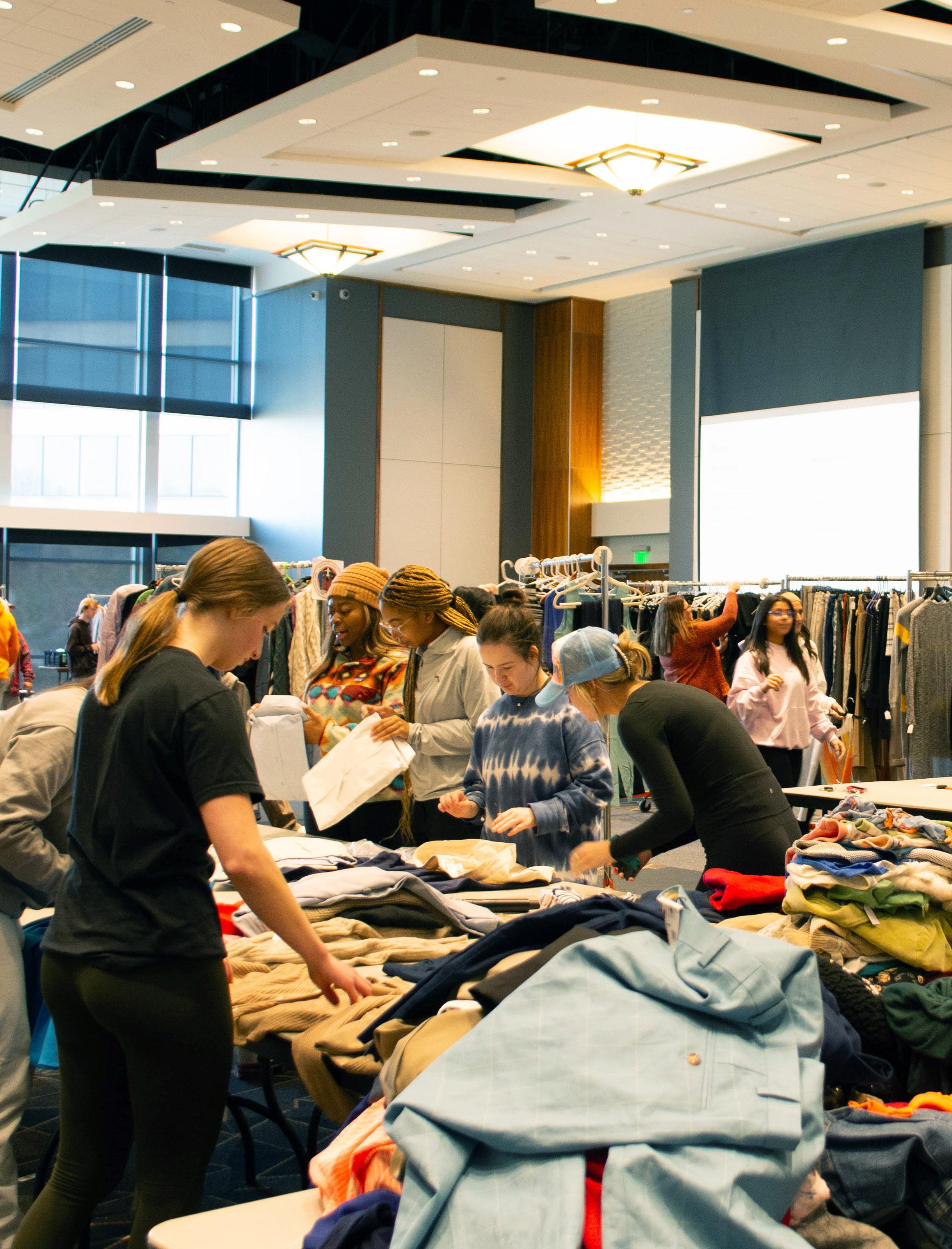
More than 150 students and 25 total staff, faculty, and alumni volunteered.
18
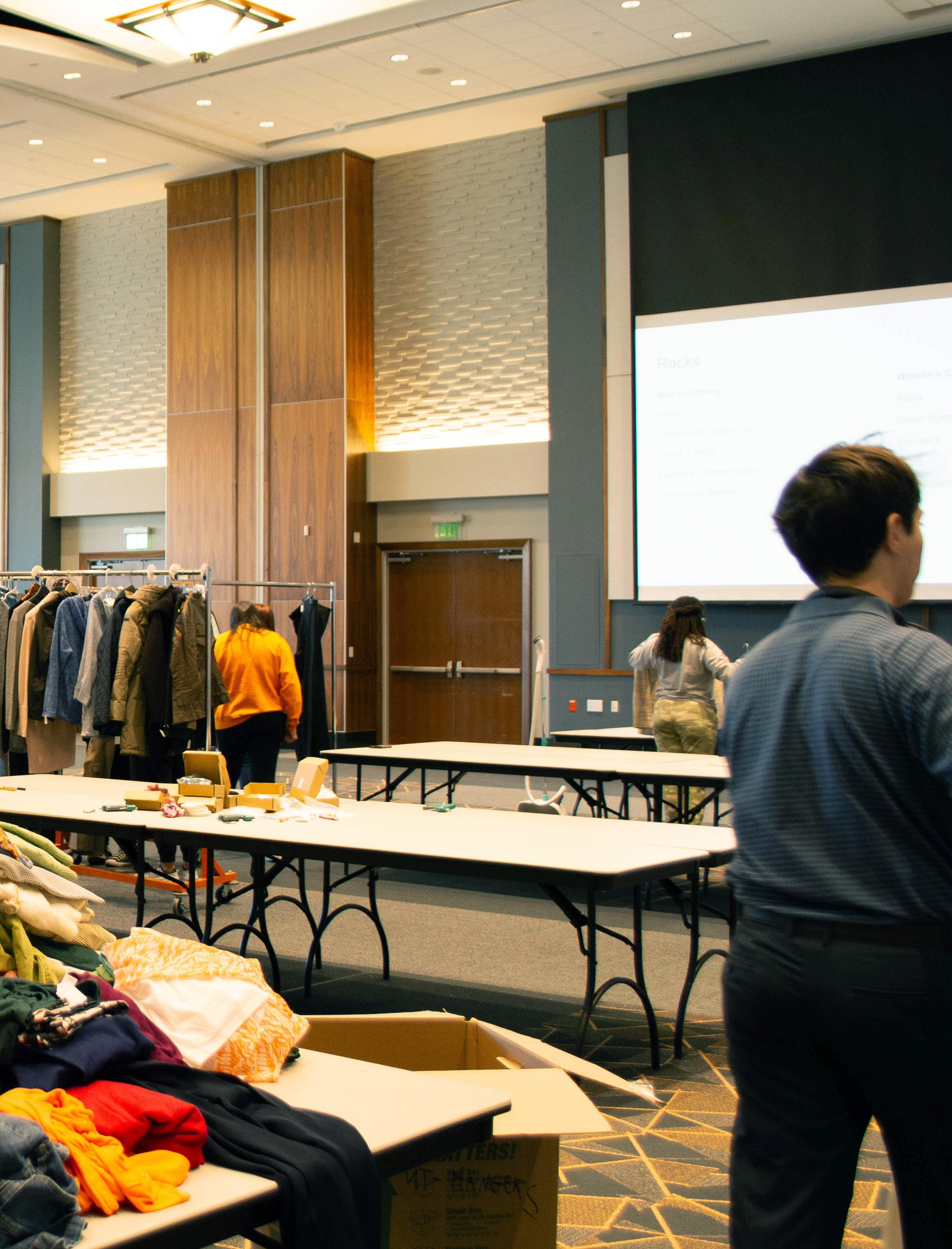
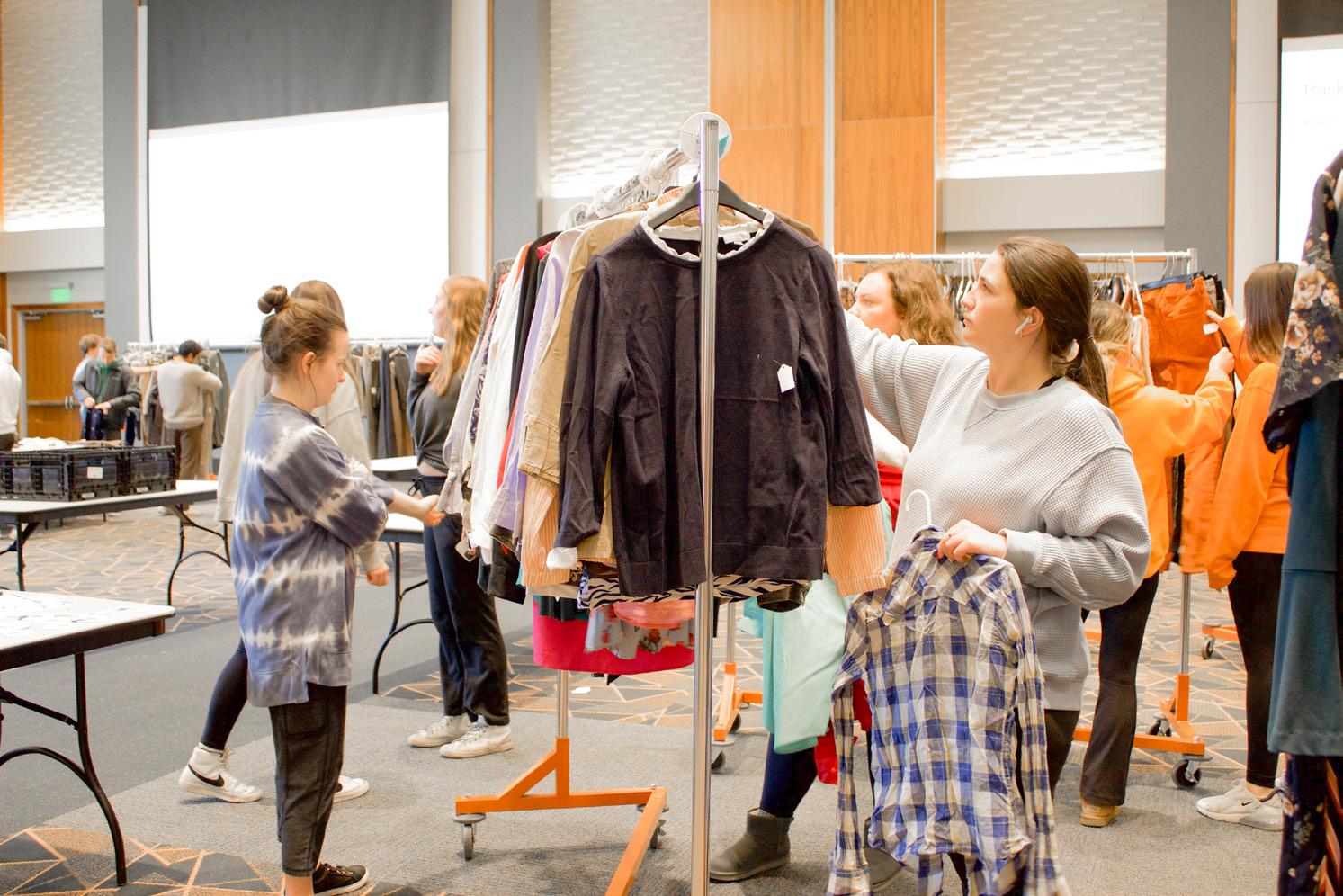

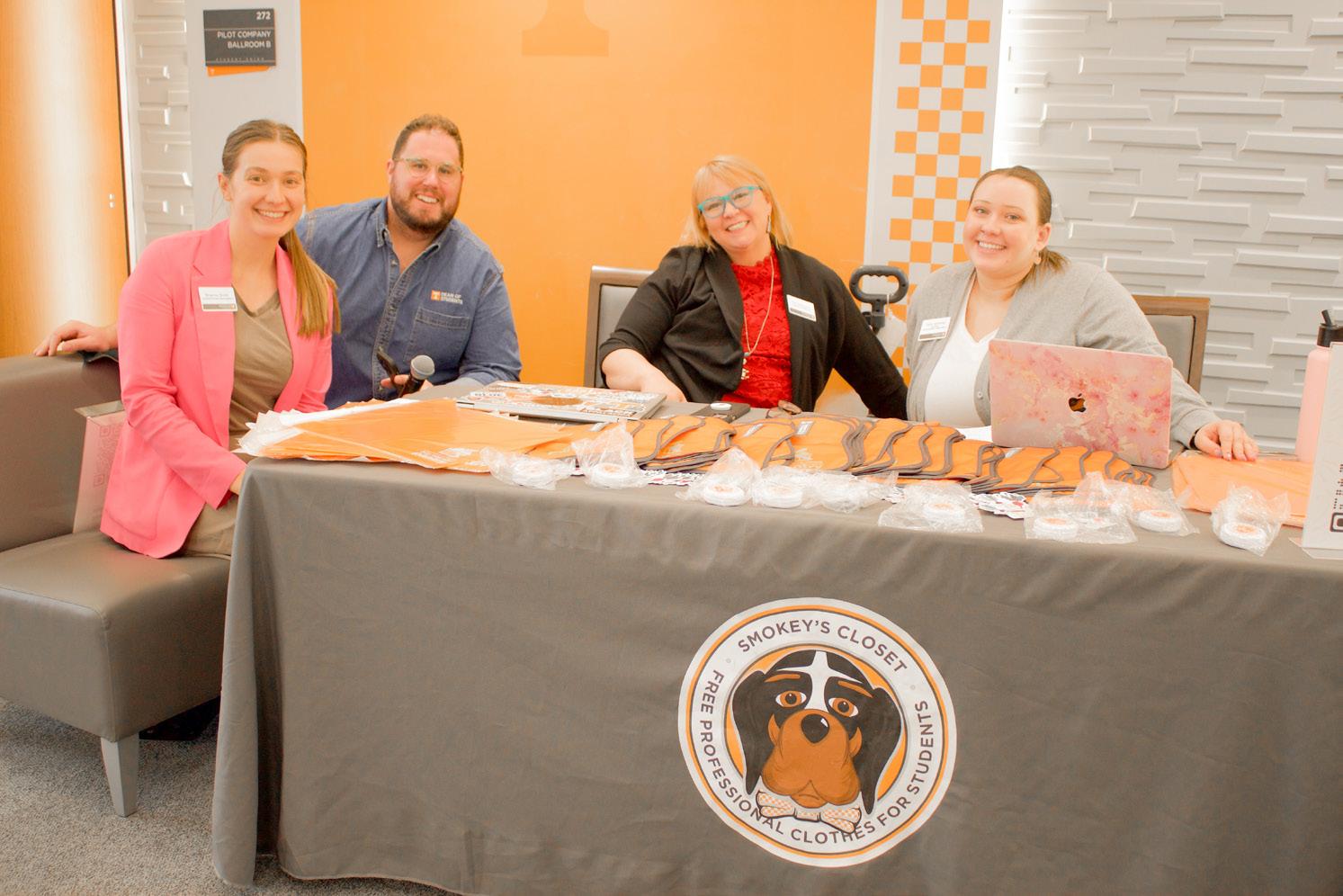
19
CobiEVERYONE NEEDS A
IN THEIR LIFE
“When you feel like a tiny fish in this giant pond called UT, at the very least you can know that your RA is there for you, checking on you, and congratulating you on the big and the little milestones.”
That was the attitude Cobi Genna applied to being a resident assistant (RA), and she carried the same perspective through several roles within University Housing.
Genna began working in University Housing in the fall of 2019 during her freshman year. A close family friend had worked in housing before and helped her make a connection to an open position. Genna worked the front desk of the main University Housing office located in Magnolia Hall. Additionally, Genna also became involved as a resident in Hess Hall her freshman year. Serving as president of the Hess Hall Council, she planned educational and social experiences for the entire hall, working with RAs to coordinate 2–3 social and educational events each month. Proudly, Genna recalls that the Hess Hall Council was awarded the most spirited so many weeks in a row that United Residence Halls Council removed the award altogether.
undergraduates who coordinated emergency maintenance and housekeeping.
The pandemic meant an incredible shift in operations for this team. While University Housing continued work as an emergency services unit, the call center shifted to support emergency housing for students with COVID-19 to help meet UT’s isolation protocols. Part of the new responsibility was to inventory and identify available beds on campus to support students in need.
“It was a very stressful time, so naturally deep and intimate connections were created within the undergraduate staff and with housing leadership,” adds Genna. At the end of her freshman year, Genna applied to be a resident assistant and continue her work with housing.
“I would say to my students, ‘You have the choice to become your own person here. How can I help you do that?’”
—Cobi Genna
“At the call center, I had a lot of interaction with hall directors and housing leadership,” says Genna. “The first activity for RA applicants was a meet and greet, but I already had relationships with so many of those leaders. I just got to put faces to names and voices I had heard over the phone.”
In the spring of 2020, amid the COVID-19 pandemic, Genna continued her work with the department in the housing call center, a 24-hour response team run completely by
Genna joined the RA team in Robinson Hall and continued to serve there as an RA through the rest of her undergraduate career, graduating in spring 2023 with a bachelor’s degree in geology and environmental studies. She also continued working at the call center as well, being promoted to student director after two years.
” 20
“
In Robinson Hall, she served as the hall council liaison, assisting the hall council with their programming and advising them on any potential issues. Pandemic-related challenges continued while she was an RA, but she worked diligently to help students remain connected to one another.
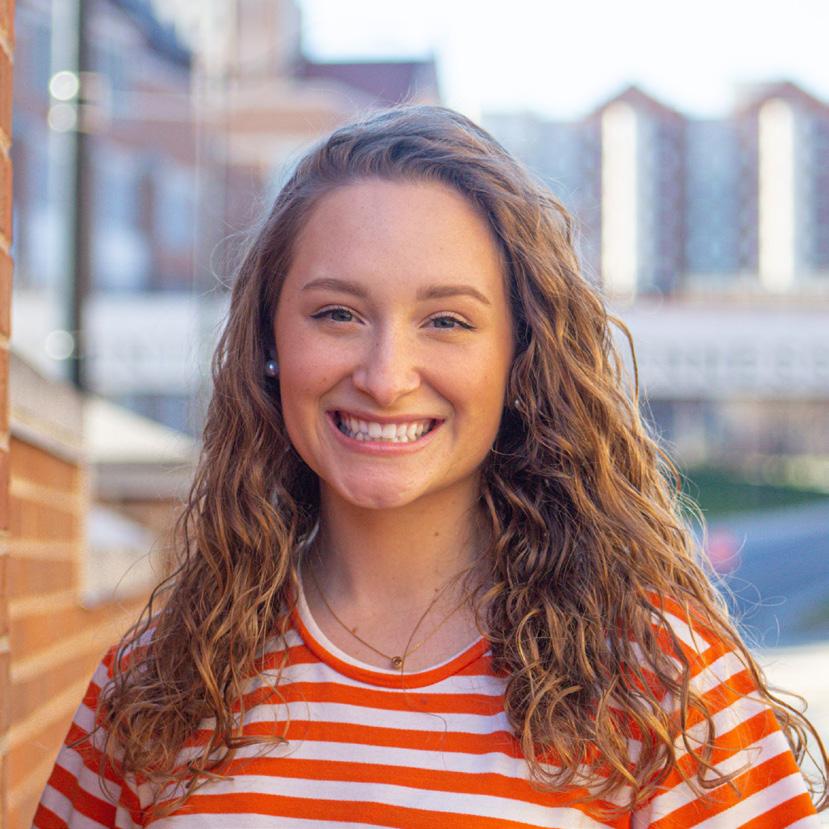
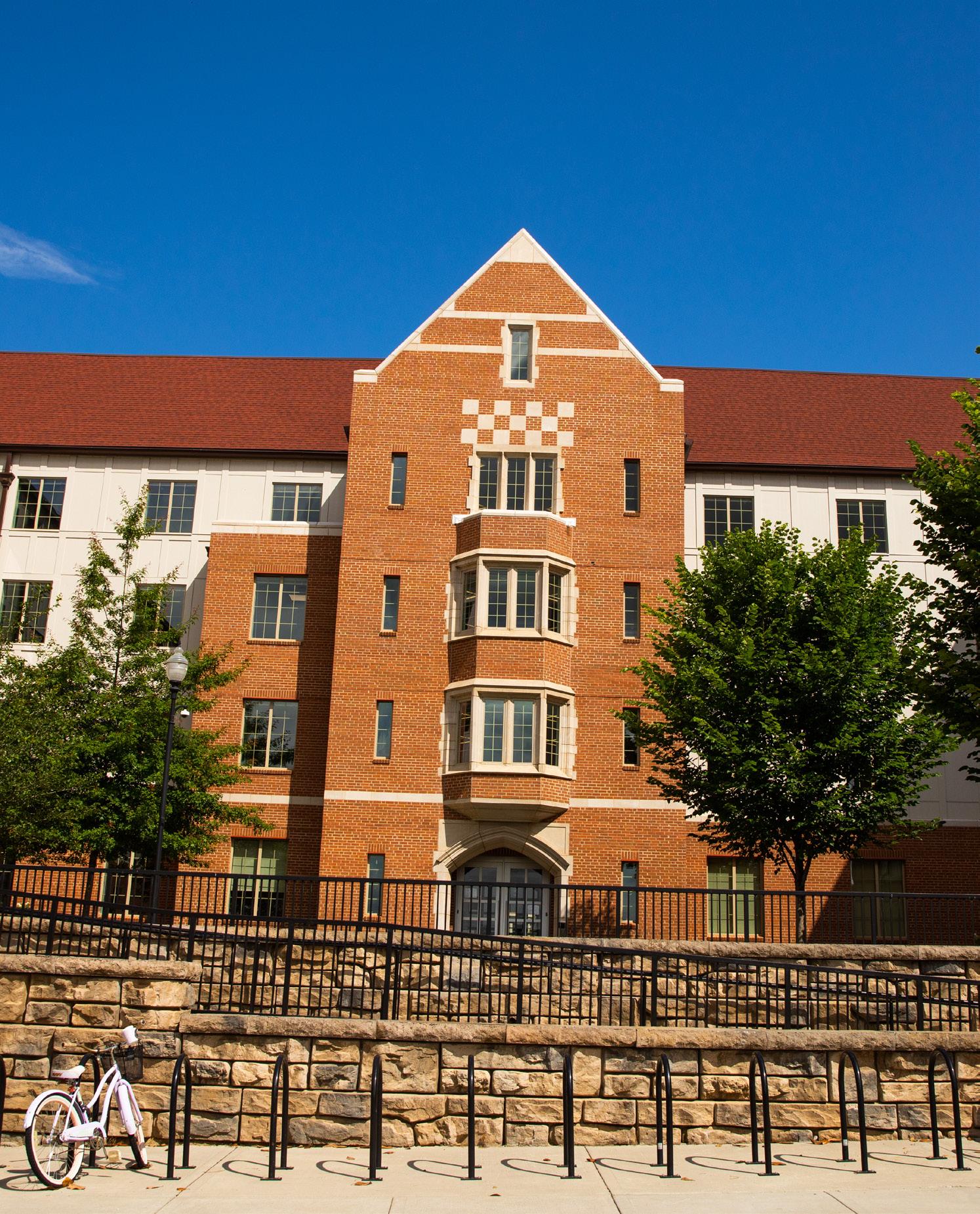
“I wanted to be there for my students. I’ll walk with you to events or to the dining hall so that you don’t have to go alone. I’ll step in and make sure that you see that the things you’re interested in are important,” says Genna. “I would say to my students, ‘You have the choice to become your own person here. How can I help you do that?’”
Genna shares that social media also helped her create connections with students. She would
encourage students by commenting on posts or message them to say how proud she was of them.
Genna also joined the National Residence Hall Honorary and attended three national conferences, four regional conferences, and two state conferences through that involvement. While at these events, she also presented on various topics, like inclusive programming to include residents of all ability levels, models for RAs during the COVID-19 pandemic, and navigating conflict and difficult conversations
PRIORITY 1
21
as a campus leader. These conference opportunities provided space for Genna to network with housing leaders from across the US but also provided critical learning components.
“I started learning how people like to be recognized and how I as a leader can recognize my staff to make them feel seen, valued, and understood,” says Genna.
““I wanted to be there for my students. I’ll walk with you to events or to the dining hall so that you don’t have to go alone. I’ll step in and make sure that you see that the things you’re interested in are important.”
—Cobi Genna
”“I want them to feel like they’re part of a shared vision. And not only staff, but residents—I wanted to make residents feel like they’re part of the floor and they have a place at the university.”
Genna is currently pursuing a master’s in education through UT, with plans to graduate in spring 2024. Cobi says that the two biggest takeaways from her experiences with housing are leadership skills and the ability to create meaningful recognition for others.
She notes that it’s nearly impossible for students serving as RAs to leave that experience without increasing their ability to lead others. University Housing does a great job of putting RAs in positions of leadership, building them up, and helping them find what kind of leader they are.
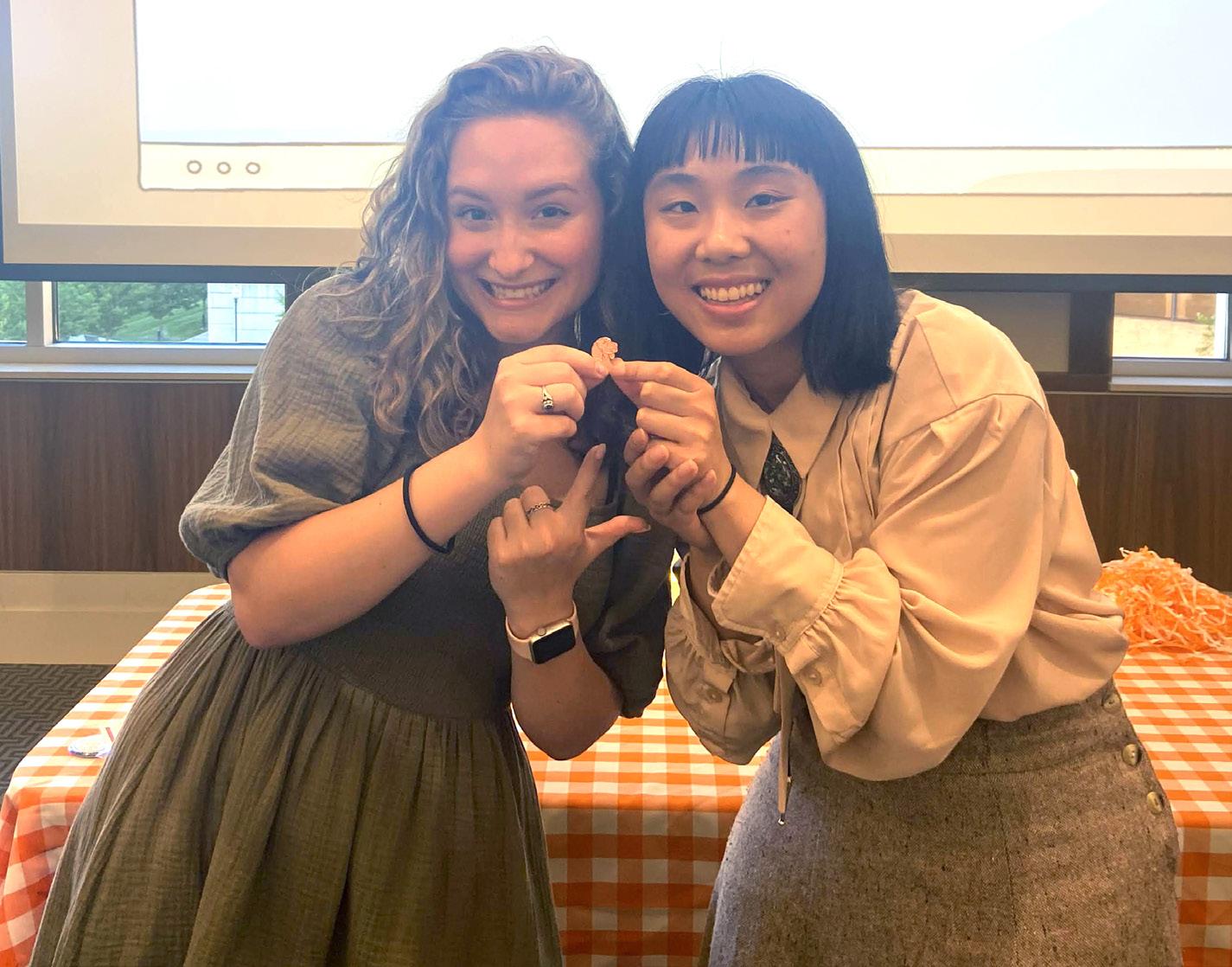
22
Through University Housing’s culture of celebrating staff, Genna also learned ways to see when recognition wasn’t appreciated and identify ways to fix that in order to help staff know that they are valued.
From working the front desk to managing the call center and serving as an RA, University Housing roles elevated Genna’s natural leadership skills and sharpened her abilities in many areas. Now, she feels confident in helping multiple team members coordinate. She’s able to communicate effectively and change communication tactics based on specified goals, the severity of the situation, and what is needed from each person involved.
“Without a doubt, I can say that working in housing and all the positions I had has completely changed who I am,” adds Genna. “The ability to interact with so many different types of people in so many different capacities, being able to coordinate skills from so many different areas and synthesize that information to create a shared vision is a skill I will carry forward for my entire career. Now as I step into teaching, I know from my years of experience with housing that those are areas I’m strong in.”
Each year, University Housing supports 8,700 on-campus residents. University Housing is made up of more than 660 staff members, including 440 student employees, supporting student living experiences that accentuate learning
and growing.


23

24
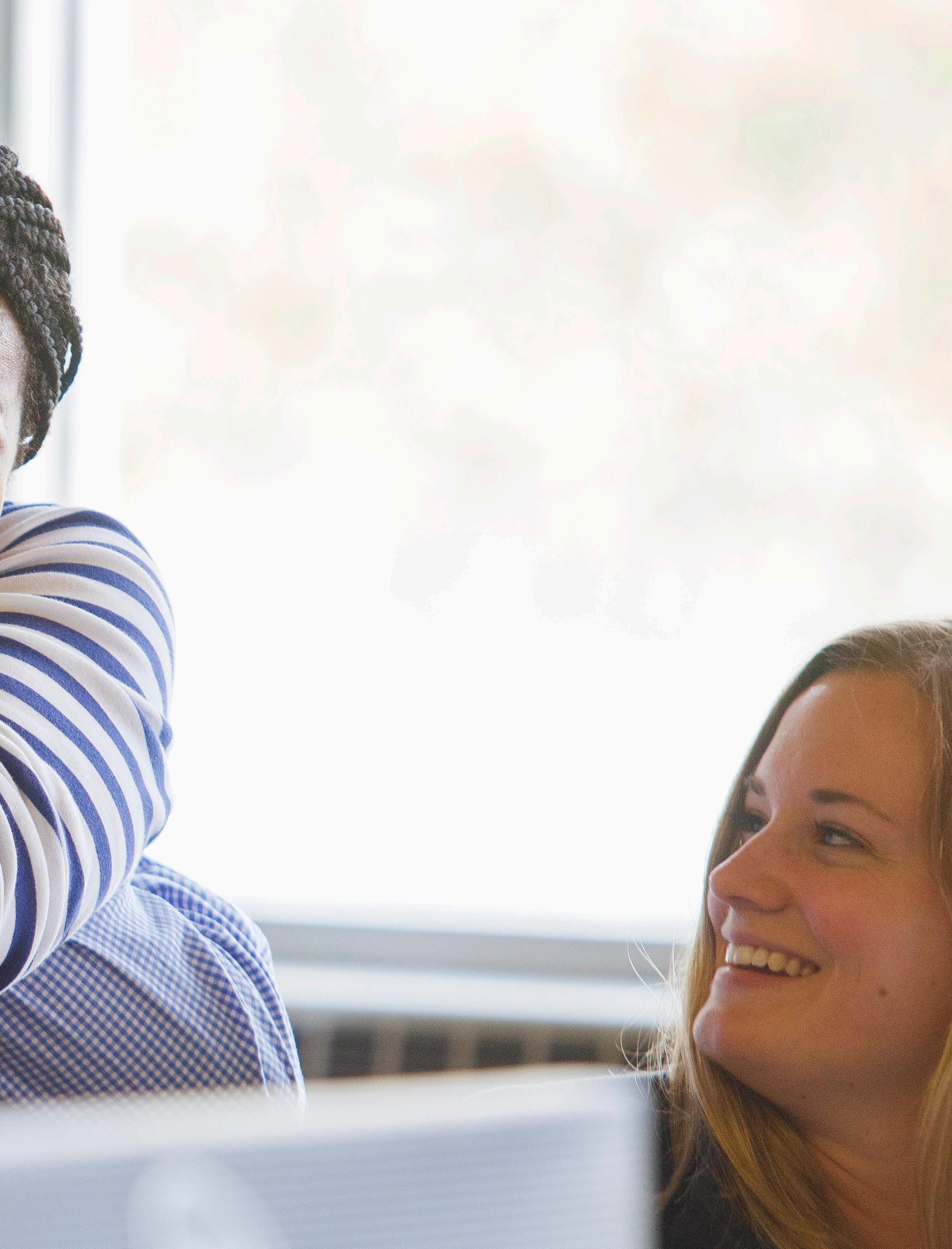
PRIORITY 2
Culture of Inclusivity and Care
The Division of Student Life cultivates inclusive education, programming, and services. We develop and implement care and support initiatives that foster success and well-being.
25
Two-Pronged Approach to Alcohol Education to Support Healthier Decisions On Campus
According to the 2022 National Survey on Drug Use and Health, while roughly half of America’s college students reported consuming alcohol in the past month roughly half did not. But for many students embarking on their university careers, consuming alcohol can feel like a rite of passage or perhaps something they need to do to fit in on campus. The perception is that everyone drinks in college, even though the reality is a much smaller number.
UT’s Center for Health Education and Wellness is currently deploying a two-pronged approach to help college students feel emboldened in their choice to abstain from alcohol and to recover from alcohol or substance abuse if they develop an addiction.
Education Module for First-Year and Transfer Students
While the center has been offering alcohol education for years in conjunction with new student orientation, in 2023 the center partnered with the Office of Title IX to offer an AlcoholEDU course through a virtual format along with a sexual assault prevention course.
The courses were offered during the summer to all first-year and transfer students entering UT in the fall, and more than 90% of students invited to take the AlcoholEDU module completed it. The course also included a pre-test and post-test to see what students knew at the start of the module and what they learned throughout.
“Providing this education to students through a virtual format before they ever step foot on campus is a much more comprehensive approach to capturing incoming students,” said Matilene Osho, assistant director for the Center for Health Education and Wellness.
Students who completed the module were also sent a short survey 30 days after completion, which for many coincided with their arrival on campus or within a few weeks of arriving on campus. This survey gauged what knowledge students retained from the course, with 52% of students completing the post survey.
Overall, the results were significant, with students retaining important knowledge that can help them make healthier decisions on campus regarding alcohol.
“Offering these online modules will continue in future semesters, including spring 2024 for new students and transfer students, along with the pre- and post-surveys to assess what they’ve learned,” added Osho.
In 2023 the center saw significant improvement in the knowledge of first-year students who completed AlcoholEDU. Whenever students’

MORE THAN 90%
Of first-year and transfer students invited to complete the AlcoholEDU module online completed it.
26
behavior results in misconduct, some first-year students even referenced AlcoholEDU in their screening assessments, which are also conducted by the center.
“We can definitely tell that this program is helping students make better decisions, and even when they’ve made a poor decision they can revert back to that knowledge so that they don’t repeat that same mistake again,” concluded Osho.
Rocky Top Recovery Supports Student Sobriety
The Center for Health Education and Wellness also facilitates the Rocky Top Recovery program that helps students in recovery find community, solidarity, and persistence.
“While collegiate recovery programs are relatively new and not very common, the existence of one can determine whether some students apply to the university at all because it’s a service they need,” said Nicole Wiggs, wellness coordinator for Rocky Top Recovery. “When students see Rocky Top Recovery on our website and they’ve struggled with addiction, they know they can find support for their unique needs.”
Originally, Rocky Top Recovery was a studentrun organization but struggled as students matriculated. In 2022–2023, student ambassadors reformed Rocky Top Recovery through UT’s Institute for Public Service. Finally, in mid-2023, grant funding was secured through the Tennessee Department of Mental Health and Substance
Abuse Services to support a full-time coordinator and supply program funds.
From alcohol addiction to substance use disorder, students at varying places on the recovery journey can find support and community on campus. The Center for Health Education and Wellness also employs students who serve as peer support for students and are available to students at risk for alcohol addiction, too.
79%
“Through Rocky Top Recovery, we support an allrecovery model, which means supporting students who are dealing with mental health diagnoses or process addictions like gambling, shopping, eating disorders, or sex addiction,” continued Wiggs. Together these programs aim to help students make healthier decisions related to alcohol and substance abuse and find greater levels of overall well-being.
“While collegiate recovery programs are relatively new and not very common, the existence of one can determine whether some students apply at all because it’s a service they need.”
—Nicole Wiggs
DID YOU KNOW?
“ ”

According to the AlcoholEDU course, a lot of students don’t drink and only a small percentage drink heavily.
Before completing the course, only 12% of participants knew this. In the post-course assessment, 79% of students correctly identified this as the correct way to describe the drinking habits of college students.
PRIORITY 2
0 10 20 30 40 50 60 70 80 Before completing AlcoholEDU After completing AlcoholEDU
12%
27
FEELIN’ FINE:
TENNESSEE’S ONLY ACCREDITED STUDENT HEALTH
CENTER SETS THE STANDARD FOR BEST PRACTICE
In the 2022–2023 academic year, 10,836 students received care at the Student Health Center at a total of 26,452 appointments. The process for ensuring that every single one of those students receives the best care possible is an ongoing, self-monitored, and perpetual process.
The Student Health Center is accredited by the Accreditation Association for Ambulatory Health Care (AAAHC), a governing body that grants accreditation to clinics, community health centers, military health centers, oncology centers, and many other types of facilities. Through this body, accreditation is completed once every three years, or roughly every 1,095 days.
This compressed timeline, compared to a fiveyear cycle for most university departments and programs, means that center staff must implement an ongoing and rigorous selfimprovement process to maintain accreditation but also to maintain standards of care for such a high volume of patients.
Accreditation through AAAHC or other governing bodies is an opt-in process that centers voluntarily submit to. Of roughly 4,000 universities located across the US, only about 2,000 have student health centers at all, with only 275 of those being accredited through AAAHC. In Tennessee, UT’s Student Health Center is the only accredited center in the entire state that serves university students.
Ultimately, this means that the Student Health Center is in an elite class providing excellent care to the student body.
The overall goal of the accreditation process is to improve the quality and safety of the care provided to the patient population by implementing policy and procedure changes recommended by an external reviewer. AAAHC has more than 800 standards that student health centers must follow and comply with to achieve accreditation, and each individual center’s review is tailored based on the scope of services provided at that location. For UT’s Student Health Center, around 600 standards apply based on the services offered. To be accredited, the center had to prove substantial or full compliance with all 600. And they did.
“Because this process is so detailed and in-depth, we begin preparing for the next accreditation cycle immediately after the current one concludes,” states Dr. Spencer Gregg, director of the center. “But each accreditation cycle is a unique experience, as standards of care are updated annually. So, every year whether we’re in an accreditation cycle or not, our policies and procedures are updated as well. This means that the care available continues to improve and adjust as needed but also ensures that the facility in which that care is provided is as safe as possible for students.”
Center staff conduct ongoing reviews of medical records, personnel records, incident reports, student complaints, and student satisfaction scores. Health care practitioners also conduct peer reviews of their colleagues’ patient charts and notes, ensuring that appropriate care is provided to each patient and that appropriate documentation is completed as well. The center also benchmarks its disaster preparedness for
28

PRIORITY 2 29
scenarios like tornado, fire, active shooter, or bomb threat against other student health centers to make the facility safer. When information in any one of these areas leads to an improvement in a care standard or process, staff implement that change immediately.

When all of these steps culminated and the reaccreditation cycle arrived in 2023, Gregg was out on medical leave with Dr. Rebecca Morgan in place as acting director. Gregg left a well-detailed foundational process for staff to follow in his absence. Morgan and others developed a team approach to working through each of the 600 standards and met for several
hours each week leading up to the review, examining each standard page by page to assess what the center was doing to improve care and what examples were available to document and support that. The committee also organized a mock survey ahead of the AAAHC review to help identify any gaps in their documentation or processes.
“As a committee, the accreditation team divided and conquered in such a strategic way so that no team member experienced an undue burden during the process,” says Jill Zambito, assistant vice chancellor for health and well-being in the Division of Student Life.
30
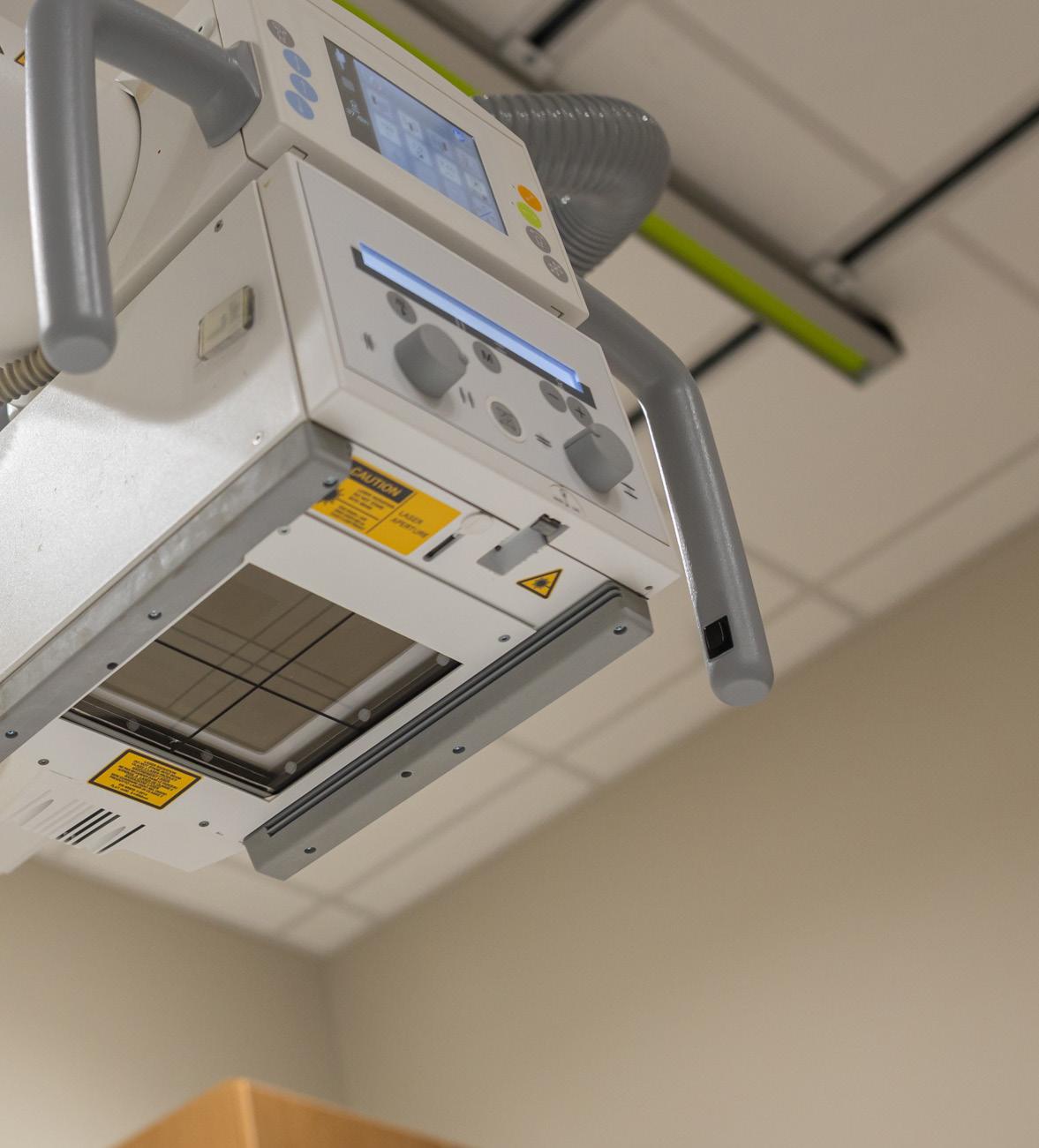
“There’s more learning in a process like this when more team members are able to contribute.”
One aspect of the review included submitting three quality improvement studies to demonstrate areas where the center had improved and continually aims to improve internally, independent of a review cycle.
The three quality improvement studies submitted were in the areas of early intervention for hypertension to reduce significant health events, COVID-19 community health intervention, and physical therapy care, which included an external benchmark with another prominent SEC school that highlighted UT’s superiority and excellence in providing this specific type of care. These quality improvement studies were based on both
internal benchmarks where the center measured against itself as well as benchmarking against other student health centers.
The Student Health Center review included inspection of written standards and policies but also inspection of physical spaces, in-depth interviews with health practitioners, and stringent review of care practices and patient notes. The Student Health Center’s peer review process was also inspected.
“It’s not just about the doctors, it’s about the entire department operating with excellence to provide care to every single student in their hour of need, helping them meet their goals for well-being, health management, and medical decision-making,” says Zambito.
31
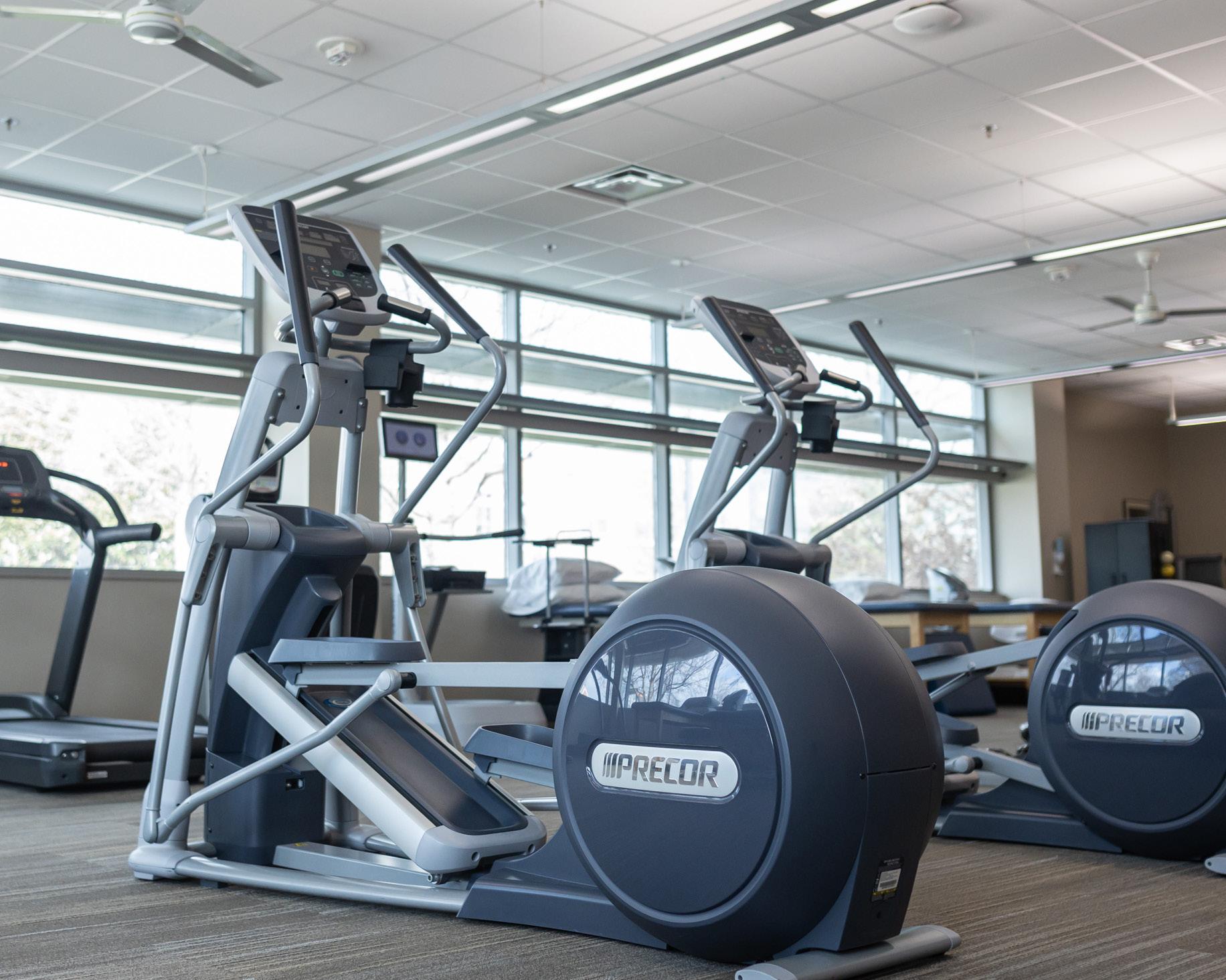
The AAAHC review categorized many procedures of the Student Health Center as a best practice that should be implemented at other institutions. Insights gained from this accreditation process at UT will be shared with other student health centers as they undergo the accreditation process in the future. And, the recommended changes found during the review are already being put into place.
“Why do we do this review every three years?” asks Dr. Rebecca Morgan, sports medicine specialist and one of the team leaders for the accreditation committee. “It’s to see if health care is changing, if positions are changing to continue providing a high quality of care. As the student population changes, so do their needs. So we have to change, modify, and reset standards to ensure we’re providing the care they need.”
One particular area of pride for the Student Health Center is the continually high patient satisfaction rates. Each student served at the center is invited to complete a satisfaction survey to share their experience receiving care and include any information about how their experience could have been better. While medical professionals tend to focus on what goes wrong in a situation or on negative health outcomes, the student body is extremely satisfied with the care received at the Student Health Center. From the front-line team member greeting students who enter to the staff cleaning the floors to the health professional providing patient care, satisfaction scores were extremely high across the board.
32
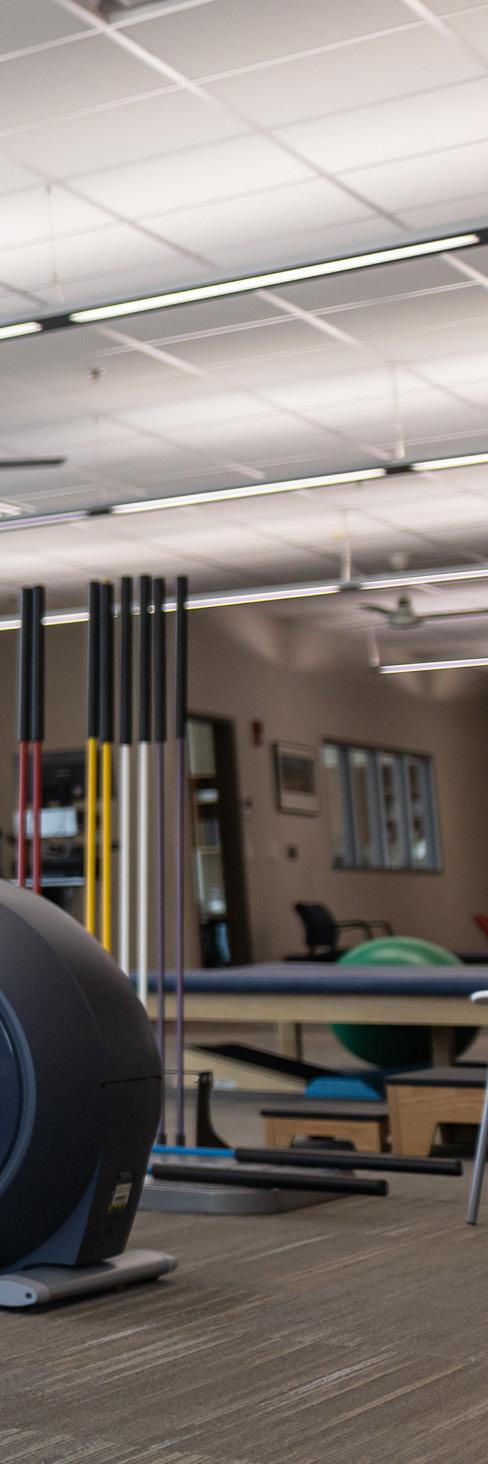
THE ACCREDITATION TEAM INCLUDED:
Debbie Blair, Business Manager
Darrell Brackett, Associate Health Center Director
Stacie Dixon, Nursing Supervisor and Safety Officer
Becky Morgan, Sports Medicine Physician
Carman North, Community Health Team
Todd Webb, Laboratory Supervisor
The AAAHC review categorized many procedures of the Student Health Center as a best practice that should be implemented at other institutions.
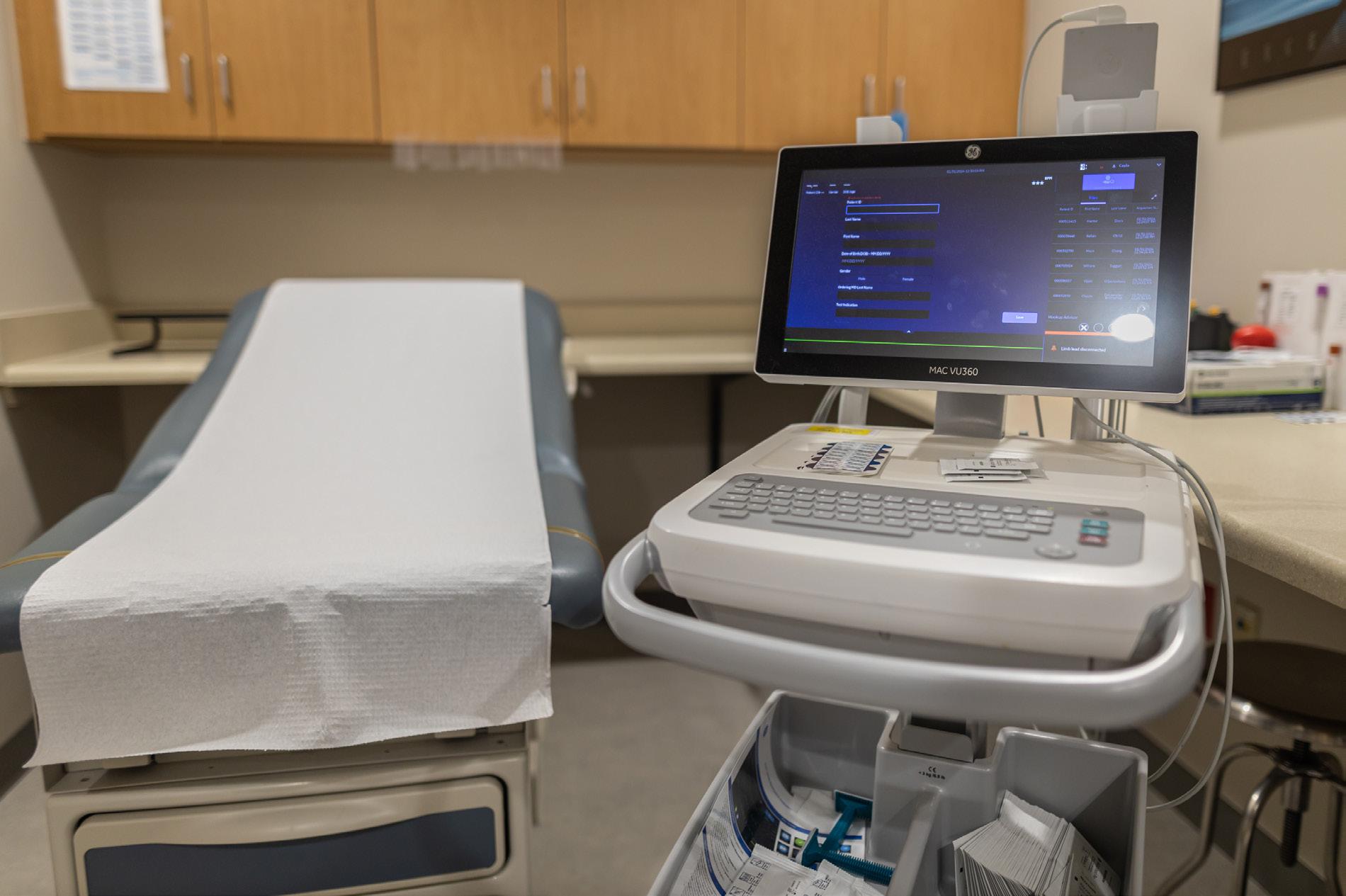
Patient Satisfaction Survey Responses
96.7% of respondents indicated that they were satisfied that the provider had listened carefully to their concerns.
96.5% of respondents indicated that their provider accepted what they said without judging them.
97.5% of respondents indicated that the provider fostered a safe and trusting environment.
95.7% of respondents indicated that they received info during their visit that they will use to improve health.
90.6% of respondents agreed that the services they received here made it easier for them to stay in school by addressing their medical or mental health concerns.
96.0% of respondents indicated that they were satisfied with the staff’s ability to provide an inclusive, accepting, and diverse health care environment.
33
New Inclusive Excellence Program Guide Supports Access for All
Whenever accessibility and inclusion are built into design and planning up front, everyone benefits. An example of this is the well-known “curb cut effect.” When sidewalk curbs are cut to create accessible pathways at crosswalks or other entry points, people with disabilities have greater access. But this greater access also creates a more welcoming environment for delivery workers using dollies, parents or caregivers walking with strollers, bicyclists, and travelers wielding suitcases.
But how does this effect translate to event planning for campus activities? How does an event planner or organizer ensure accessibility so all attendees can enjoy and participate fully without challenges?
These are questions the Division of Student Life’s Inclusive Excellence Committee sought to answer last year. In fall 2022, members of the committee brought up concerns about events being inaccessible and a lack of consolidated resources for creating accessible programs on campus. The committee is comprised of new, middle, and senior-level staff members in the Division of Student Life who are committed to mattering and belonging efforts at UT, like making sure anyone who wants to participate in an event can do so.
What sparked was an idea for an event checklist that would help programming staff or university event planners create experiences on campus that would facilitate belonging for all community members.

With direction from pre-established resources from Multicultural Student Life, Student Disability Services, Human Resources, and other areas of UT, the Inclusive Excellence Program Guide was developed!
This guide provides descriptions, examples, and steps anyone can take to make their events and programs more accessible and inclusive to all, organized into six sections:
• Pre-event Planning and Preparation
• Assessment
•Venue and Facilities
•Technology and Virtual Programming
• Food and Materials
•Communication and Confidentiality
34

Each section includes key considerations, a planning checklist, an example or testimonial, and sources.
For example, the Venue and Facilities section of the guide provides information about inclusive and accessible amenities available on campus:
• Interfaith Meditation Space in Room 367C in the Student Union next to the Big Orange Pantry
• Meditation Space in Frieson Black Cultural Center Room 207
• All-Gender Restrooms inside the Center for Student Engagement (Student Union Room 174) and next to the Pride Center (Student Union Room 373)
• Wellness/Lactation Rooms across campus
The guide also encourages event planners to familiarize themselves with accessible exits and shelter locations in case of an emergency.
The official guide will be distributed in spring 2024 and widely implemented throughout the Division of Student Life in fall 2025.
Ultimately, there’s something for everyone at the University of Tennessee. Using the Inclusive Excellence Program Guide can help ensure that everyone can attend and enjoy events and programs designed with their experience in mind.
PRIORITY 2
35
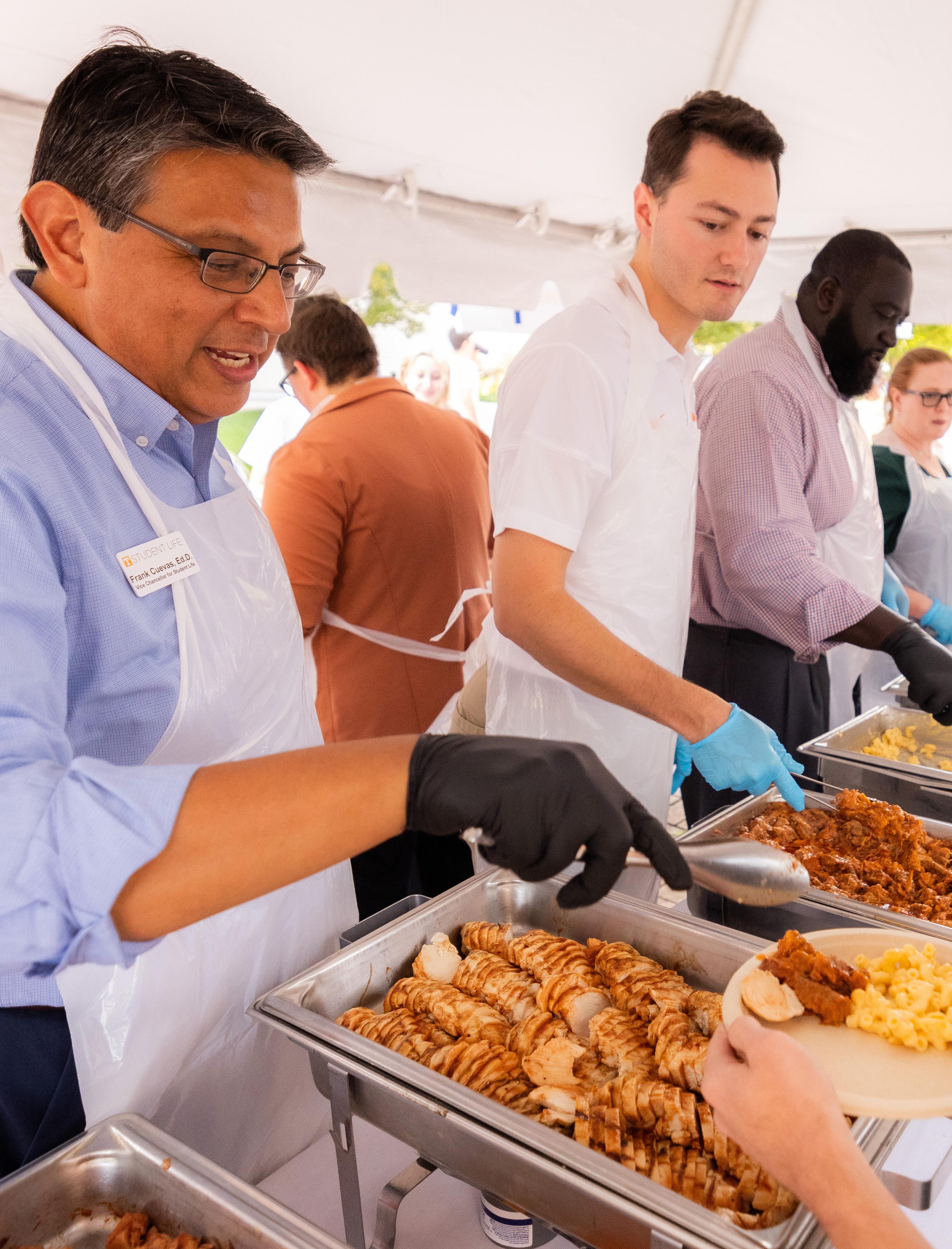
36
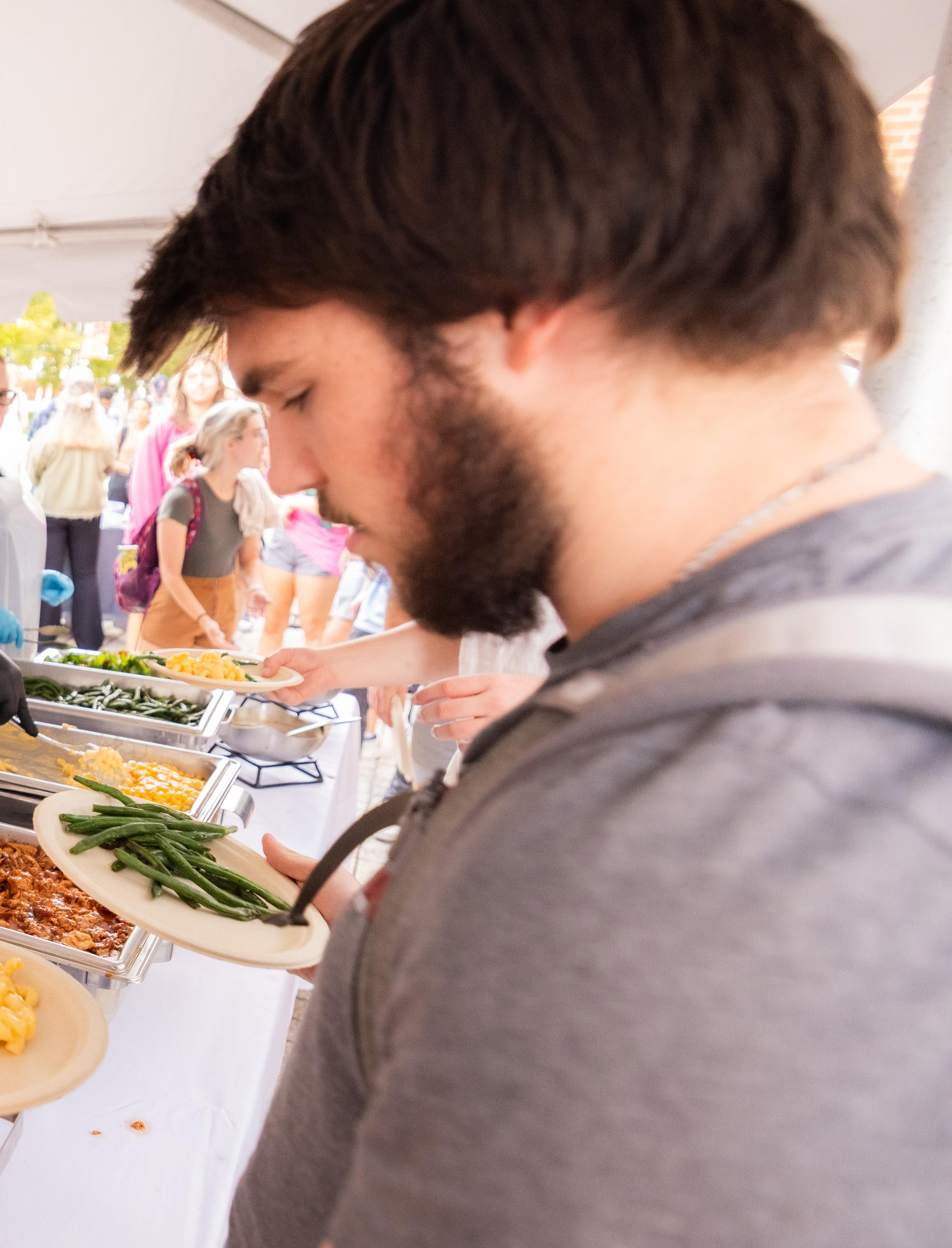
PRIORITY 3
Personal and Professional Growth
The Division of Student Life advances the personal and professional growth of students and staff through exploration and innovation.
37
New Staff Initiative Combines Food and Fellowship in Unique Way
A new Division of Student Life program invites staff to explore local restaurants owned and operated by diverse community members in Knoxville and try new foods all while investing in student development and making new connections with colleagues.
Sponsored and organized by the division’s Inclusive Excellence Committee, Open Menu is an engagement series where staff invite a student to join them for lunch at a local Knoxville restaurant. Along with fostering a relationship with a student and encouraging them, staff get to build new connections with division colleagues they might not otherwise meet. All while engaging their own taste buds and supporting locally-owned and minorityowned businesses.
members,” says Ciara Gazaway, event organizer and program director for inclusive excellence in the Office of the Dean of Students.
Each semester, Open Menu includes 3–4 lunches at restaurants like Yassin’s Falafel House, Jackie’s Dream, Potchke’s Deli, and more.

“I loved getting to attend Open Menu! I got to make some new friends among other staff and ventured to a restaurant for a delicious meal that I might never have gone to on my own,” said one staff participant. “It’s such a unique program. Food was meant to be enjoyed with others, and cultivating that across staff and students creates a rich experience that naturally builds a deeper connection to each other but also to Knoxville.”
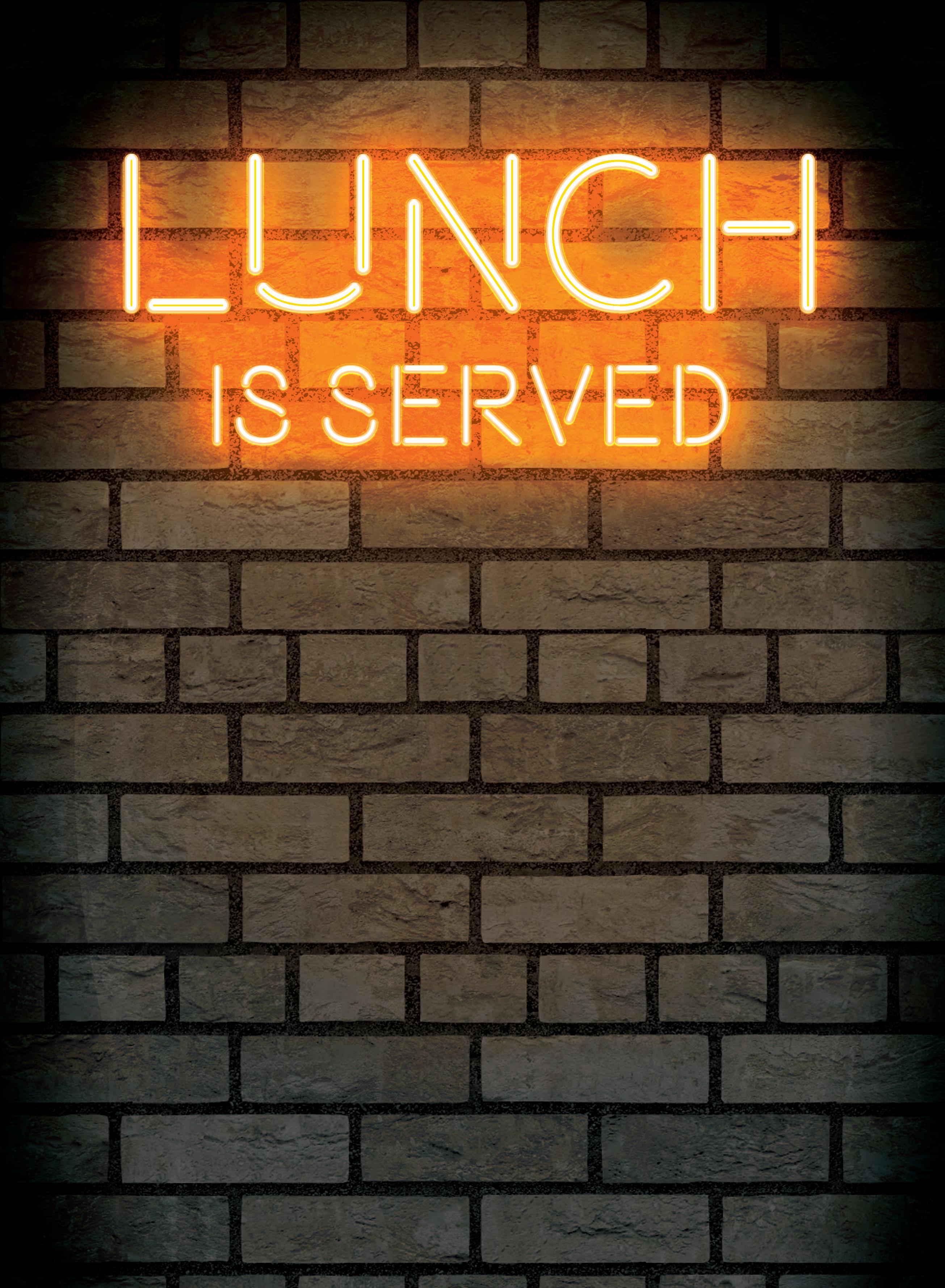
“The purpose is to provide an opportunity to explore the Knoxville community and local, diverse businesses as well as gather, share, listen, and connect with fellow community
Both transportation and meals are included for staff and student participants, which increases the programs accessibility for all Division of Student Life staff who might want to participate.
38
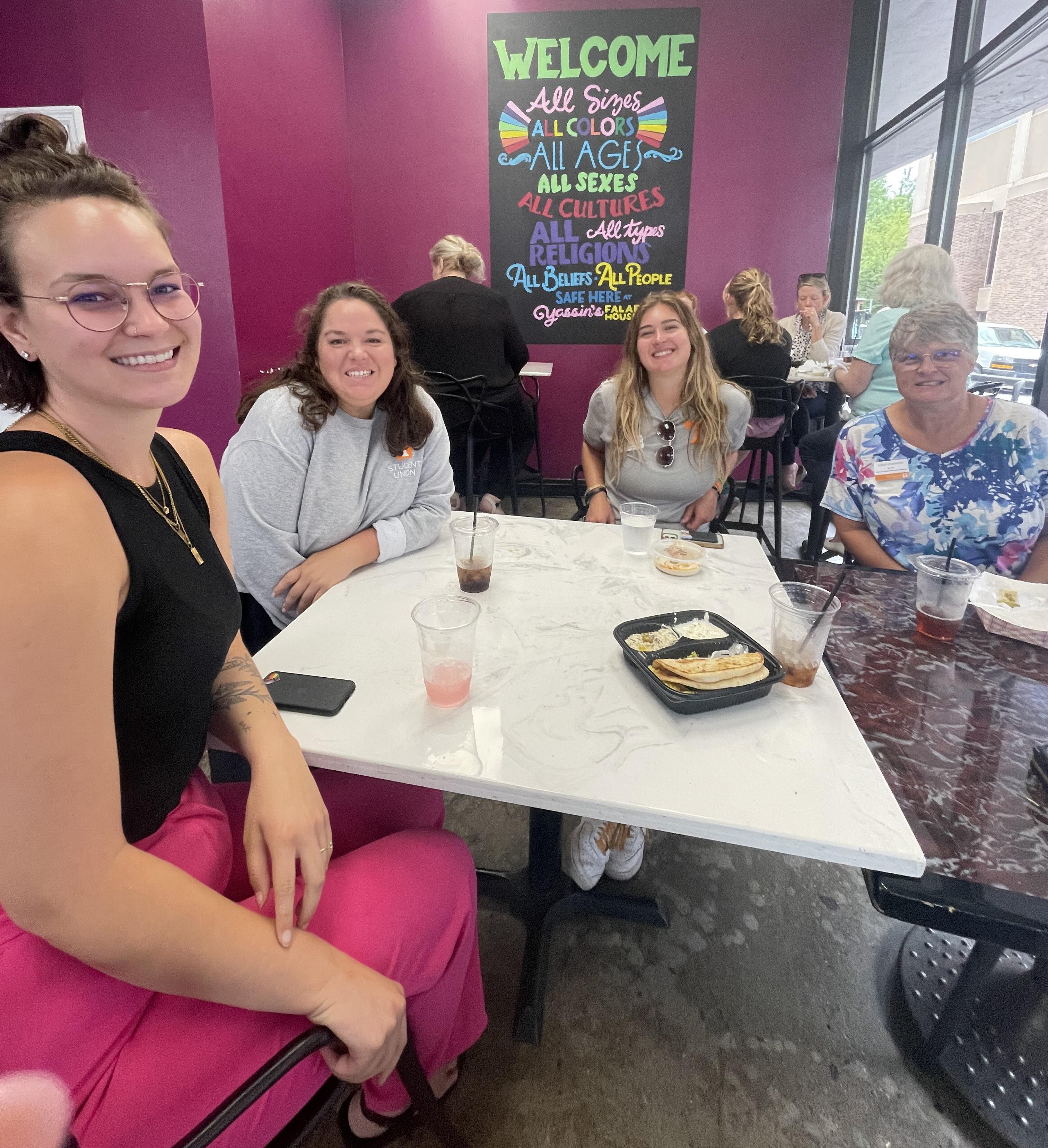
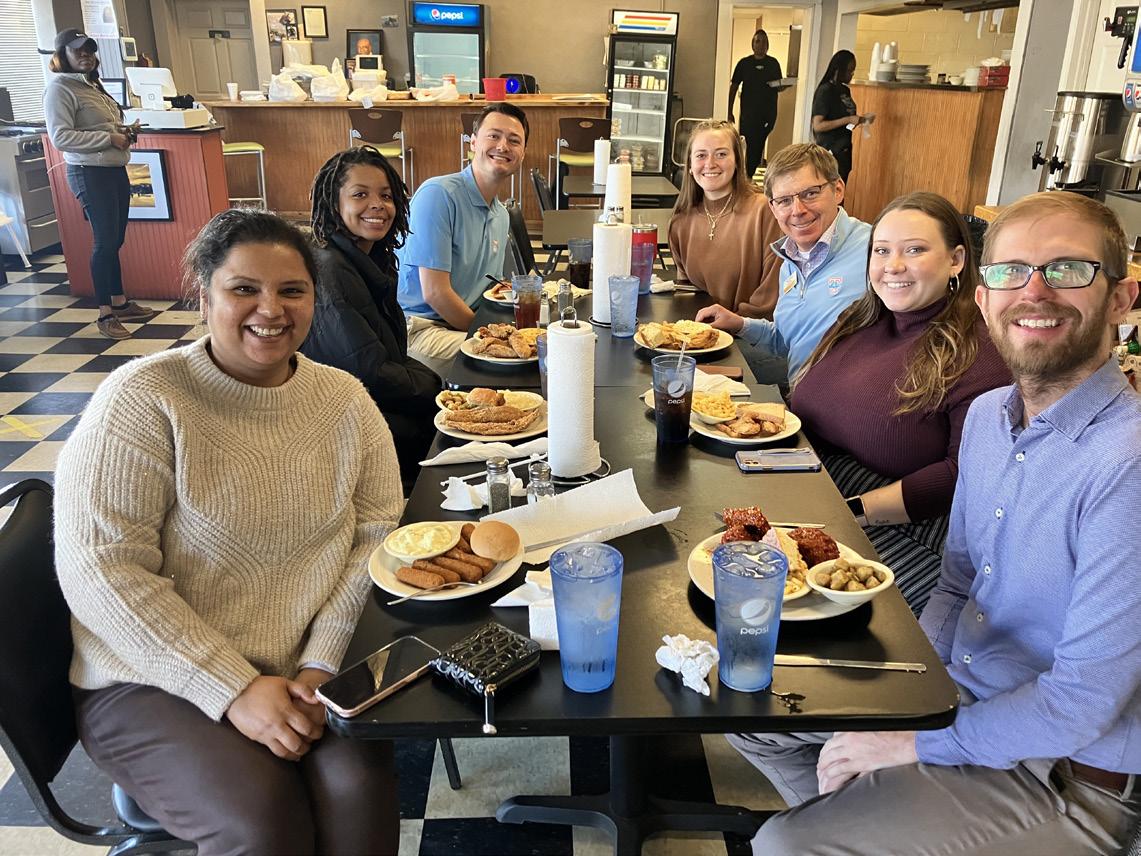
PRIORITY 3
Above: Yassin’s Falafel House hosts an Open Menu lunch outing for Student Life staff and students.
39
Right: Student Life staff and students enjoy an Open Menu lunch outing to Jackie’s Dream.
Center for Student Engagement: A Career Launchpad for the Competitive Entertainment Industry
At the Center for Student Engagement, students gain unique professional experiences that they can apply to their future careers. They also learn valuable transferable skills, such as negotiating with vendors and event planning.
“One of the things that I have really loved through my time working in the Center for Student Engagement has been watching our students take the transferable skills they learn from their work with us and apply it towards rewarding careers,” says Ashleigh Moyer, director of the center.
One area where this occurs is through the Campus Events Board (CEB). Many students join CEB because they enjoy event planning. Students receive real-life experience working with talent agents and performers leading up to and the day of some very large-scale events.
“We get to see firsthand how these experiences help them land a cold call, then
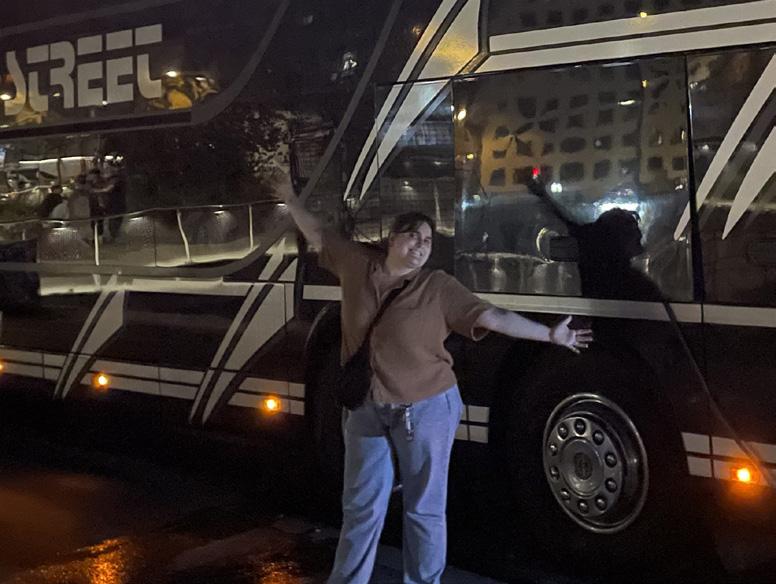
an interview, followed by jobs that they are so excited about,” adds Moyer. “We find these students often like to stay connected after college to tell us about their experiences and how they use the transferrable skills they gain in their new careers.”
Emma Nair was the president of the CEB Entertainment Committee last year and is in her first job, touring with an artist on the road in Europe. She recently sent her advisor, Dianna Foulke, this text message:
“Planning an album release party with a magician, custom cookies, etc. and so glad I had the CEB experience of communicating with these individuals and learning how to properly and professionally negotiate.”
“
“We get to see firsthand how these experiences help them land a cold call, then an interview, followed by jobs that they are so excited about.”
—Ashleigh Moyer
Through Moyer’s and Foulke’s work, young alumni are also sometimes connected back to current students for professional development opportunities, job leads, and networking.
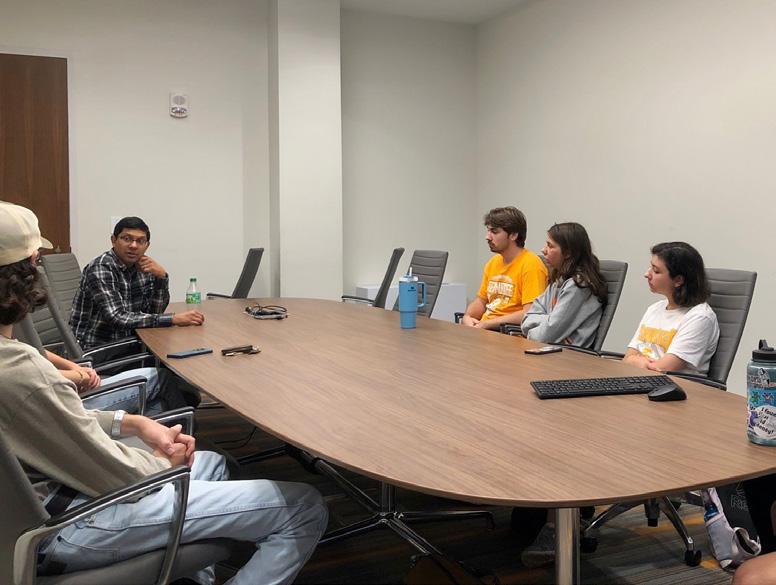
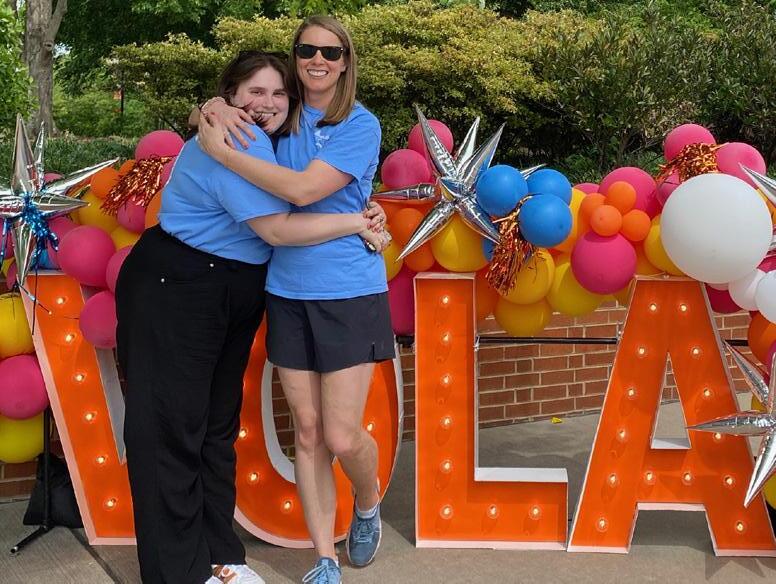

40
”
“It’s a beautiful cycle when we’re able to connect current students with alumni who are in the careers they want,” says Foulke.
While Nair just graduated last year with a bachelor of arts in psychology, some alumni return to campus and stay in touch even decades after their experience at the university. For example, alumnus Ayappa Biddanda (BA American studies and political science ‘00) recently visited campus from Nashville to meet with center staff and students in the newlycreated Music Industry Club.
Biddanda enjoys sharing his experience as a student leader and how the transferrable skills he learned through his involvement experiences helped him get his foot in the door at Vanguard and Sugar Hill Records, now part of the Concord Label Group, in Los Angeles upon graduation. In his own words, “While at the University of Tennessee, I was part of the Cultural Attractions Committee and the Issues Committee booking artists and speakers from around the globe. That gave me a taste that there was a possibility of providing a stage for world-class talent.”
Biddanda currently serves as the senior director of grass roots, video promotion/tour and events marketing for the Concord Label Group in Nashville.
Both Biddanda’s and Nair’s career success demonstrates the launchpad the center serves as for many students. Students grow, develop new skills, discover passions in music, event management, or cultural programming, and those experiences launch their futures.
“

“It’s a beautiful cycle when we’re able to connect current students with alumni who are in the careers they want.”
”
PRIORITY 3
—Dianna Foulke 41
Growing in My Leadership Skills, a Director’s Perspective
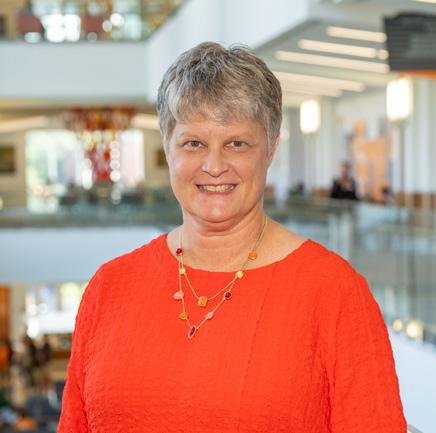
This fall, Student Life launched a new professional development initiative specifically for director-level staff. The inaugural Vice Chancellor’s Leadership Fellowship includes five cohort members: Melissa Brown, Office of Assessment and Strategic Initiatives; Jolyon Gray, Technology Services; Ashleigh Moyer, Center for Student Engagement; Anthony Prewitt, Multicultural Student Life; and Lauri Dusselier, Center for Health Education and Wellness.
Dusselier shares a first-person account of what participating in this new endeavor has meant for her leadership development.
It’s an honor to participate in the inaugural Vice Chancellor’s Leadership Fellowship. The fellowship is an educational leadership program designed to equip members of the Student Life Leadership Team with the knowledge and skills essential to our role as department heads and more broadly as part of campus leadership.
Each month from September through May we meet as a cohort with Vice Chancellor Frank Cuevas with meetings also cofacilitated by members of the Student Life Leadership Team. So far we’ve also received guest training with Amber Williams, vice provost for student success, on how to leverage our CliftonStrengths as
leaders. Additionally, we’ve been coached on our personal brand by Tisha Benton, vice chancellor for communications. Other components of the fellowship include five individual sessions of executive coaching, individual meetings with each member of the Student Life Executive Leadership Team, and two individual meetings with senior leaders external to Student Life.
My favorite aspects of the fellowship are the time spent with every person involved with it, plus the structured and intentional time to reflect on our leadership and learn from others. Our first sessions with the executive coach focused on our individual strengths related to leadership. It has been helpful to have individual coaching about my strengths from the lens of how they are beneficial in my leadership role and the possible impacts of my leadership style on others.
A book we are reading together as a cohort is providing a framework for five of our meetings. The book, One Piece of Paper: The Simple Approach to Powerful, Professional Leadership, by Mike Figliuolo (2011), uses
“
“Why do I get out of bed every day? It’s the opportunity to do intentional, meaningful work alongside dedicated people.”
42
—Lauri Dusselier ”
Lauri Dusselier Director, Center for Health Education and Wellness
In addition to the Vice Chancellor’s Leadership Fellowship, several Student Life staff are involved in cohort-model programs at UT.
Chancellor’s Leadership Academy: Susannah Marshman, Assistant Vice Chancellor for Leadership and Campus Engagement
UT Inclusive Leadership Academy: Hope Adkins, Office of the Vice Chancellor for Student Life; Todd Cox, Office of the Dean of Students; Natalie Frankel; Jones Center for Leadership and Service; Noelia Pacheco-Diaz, Office of Assessment and Strategic Initiatives
a leadership maxims approach. Maxims are personally meaningful and easily explained statements that reflect our core beliefs about leadership. The book has four main sections that focus on leading self, leading the thinking, leading your people, and leading a balanced life.
When Cuevas introduced the book, he also provided his “one piece of paper” with his leadership maxims. One of the most
compelling questions in the book that guides us to write our own maxims is “Why do you get out of bed every day?”
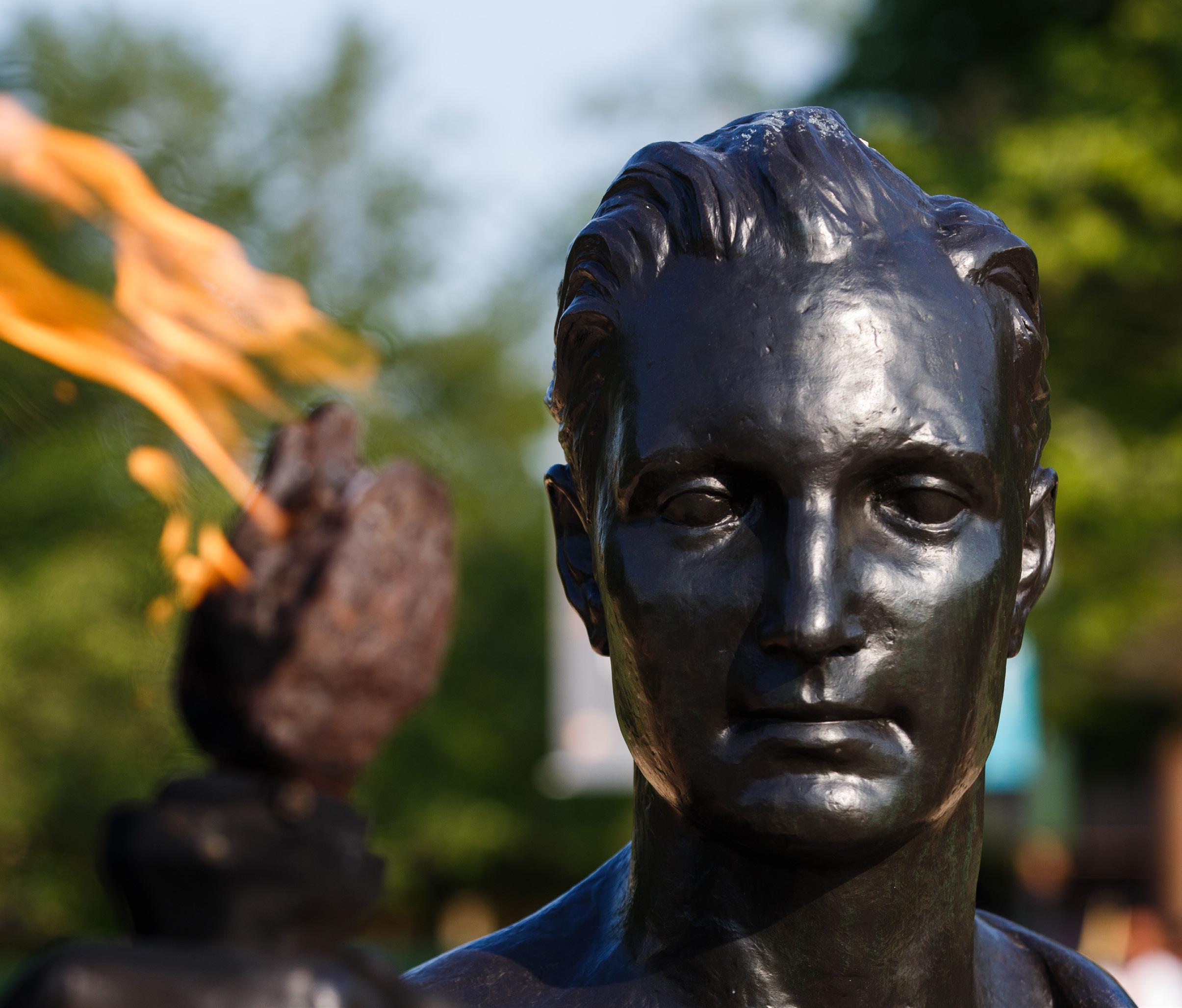
My response, just like my description of this fellowship, is the opportunity to do intentional, meaningful work alongside dedicated people. I look forward to sharing my one piece of paper with my leadership maxims at the end of the fellowship.
PRIORITY 3
43
Professional Fellowship Adopts New Model and Incorporates Designing Your Life Principles
The third priority in the Division of Student Life’s strategic plan is to advance personal and professional growth of students and staff through exploration and innovation. In the spring of 2021, a new professional fellowship program was launched in the division to facilitate this goal. Now, with 19 fellows completing the program with success and growth, it has been expanded by UT’s Human Resources to include three divisions, one department, and one college.
The original fellowship program was the brainchild of Student Life’s Jill Zambito, assistant vice chancellor for health and well-being. Zambito organized fellow placements each semester and helped bridge connections between host departments and staff looking to expand and grow.
from Human Resources, we’ve been able to expand the program to include both exempt and non-exempt staff and have sourced fellowships individual staff members can select.”
The expansion has included some changes, and as a pilot program, there may be more ahead. Currently, the fellowship is organized into two six-week periods and includes principles and concepts from Designing Your Life by Bill Burnett and Dave Evans.
“Participants return to their roles and re-evaluate problems with a new lens gained from the fellowship experience.”
—Cearra
With such a successful program, it wasn’t long before other university administrators wanted such a robust professional development opportunity available to their staff as well. Through a year-long working group consisting of Zambito, Stephanie Kit from the Division of Student Success, Dorian McCoy from the College of Education, Health, and Human Sciences, the Division of Access and Engagement’s Lamar Bryant, and Human Resources’ own Darrell Easley, the program expanded and morphed into today’s Designing Your Life Professional Fellowship.
“In the prior model, the impetus was on the individual staff member wanting to grow, with Jill providing support and connections,” says Nancy Burkett, career development coach with Human Resources. “With operational support
“ ”
Sears
During the first six-week period, the fellows meet together as a cohort for one hour each week with Burkett and Cearra Sears, fellowship administrator and career development coach with Human Resources. These sessions include introductions, a deep dive into fellows’ individual goals, and why they applied to the fellowship. Fellows also have a strategic conversation with host supervisors to help them identify their goals for the fellowship including how they will contribute in the host department and what they can expect. Burkett and Sears also help fellows walk through a life design curriculum to help identify fellows’ next steps in their careers and make connections between their work and their values.
The second six-week period features the actual department placement for the fellow, where they work 4–6 hours per week in their host area contributing to meaningful projects and exploring new strengths. Applicants can choose from a menu of host areas and individual host supervisors and can rank their choices. Burkett and Sears then match applicants and hosts according to each fellow’s preference.
44
During fall 2023, the first official class of Designing Your Life Professional Fellows completed the program.
DID YOU KNOW?
The professional fellowship is organized into two six-week periods, with the first consisting of weekly cohort meetings and the second immersion in the host department to contribute to specific projects.
Division of Student Life staff participated in the professional fellowship between its inception in 2021 and its expansion in 2023.
With ten members in the cohort, participants built deep connections and expanded their professional lens.
Nneka Walson, a coordinator in the Center for Student Engagement, was a member of fall 2023’s professional fellowship cohort. Her fellowship was spent with the Learning and Organizational Development unit in UT’s Human Resources. In this space, Walson was tasked with designing a cohort-style experience for new UT professionals that helps them better understand their professional identity, consider long- and short-term goals, and acclimate them to the Volunteer community.
“This fellowship allowed me to leverage my transferrable skillset and apply them in ways that heighten my multiple career trajectories,” says Walson. “It challenged me to think about my work generically in a person-focused lens instead of a student-focused lens, which is my current work.”
The program is ideal for people who are looking to explore career options within UT, to learn what it’s like to work in other areas, but not necessarily to leave their current role. Many participants note that the fellowship provided greater insight that informed their current role and allowed them to incorporate new knowledge into both their dayto-day responsibilities and their long-term career plans.
“The fellowship gives staff a chance to get a fresh perspective and feel refreshed,” says Sears.
“They could return to their roles and re-evaluate problems with a new lens gained from the fellowship experience.”
Each fellow also identifies how many hours of work they can complete in their host department, allotting time to work on projects purposefully so that their regular work isn’t negatively impacted. Four of the ten fall fellows even extended their fellowship to see a project through to completion, which highlights the value of their contributions to host departments and host supervisors as well.
“Through the fellowship, you’re able to immerse yourself in the work of another office, learning how other units at UT prioritize student success, enhance the student experience, and support the institution as a whole,” adds Walson. “You also have the opportunity to establish yourself in a cohort of like-minded individuals and literally design your life to reflect your personal career goals and create a path to reach them. I would absolutely encourage other colleagues to apply for future semesters.”
The Designing Your Life Fellowship Program may continue to evolve or expand to include additional areas within UT, but for now it’s more than safe to say that it is contributing greatly to the professional growth of staff and promoting connections and new perspectives at UT for participants, supervisors, and host departments.
PRIORITY 3
! 19
45
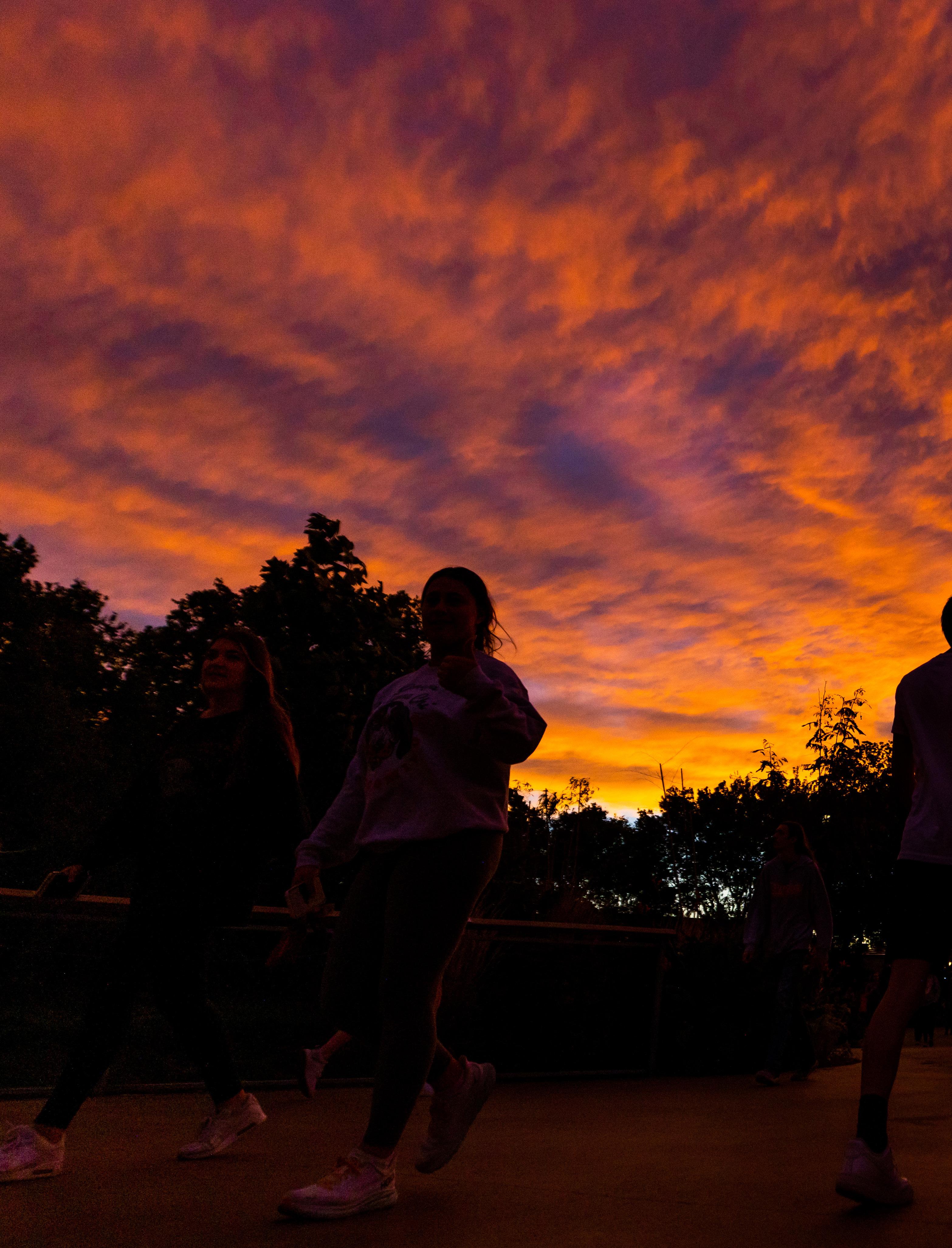
PRIORITY 4
Responsible and Effective Stewardship
The Division of Student Life responsibly and creatively stewards university resources to maximize the student experience and subsequent student learning. We empower and sustain a culture of collaboration, adaptability, and innovation.
46
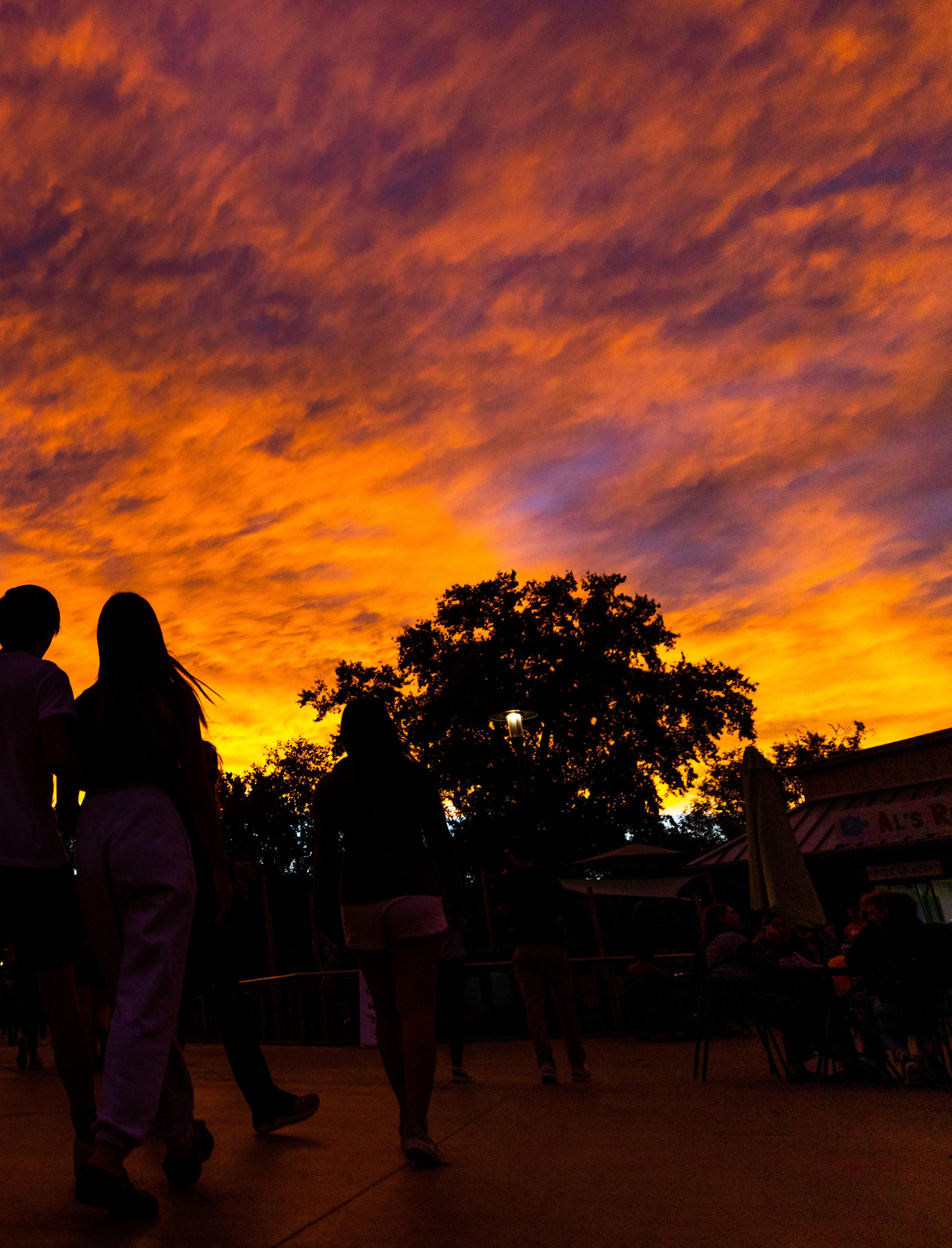
47
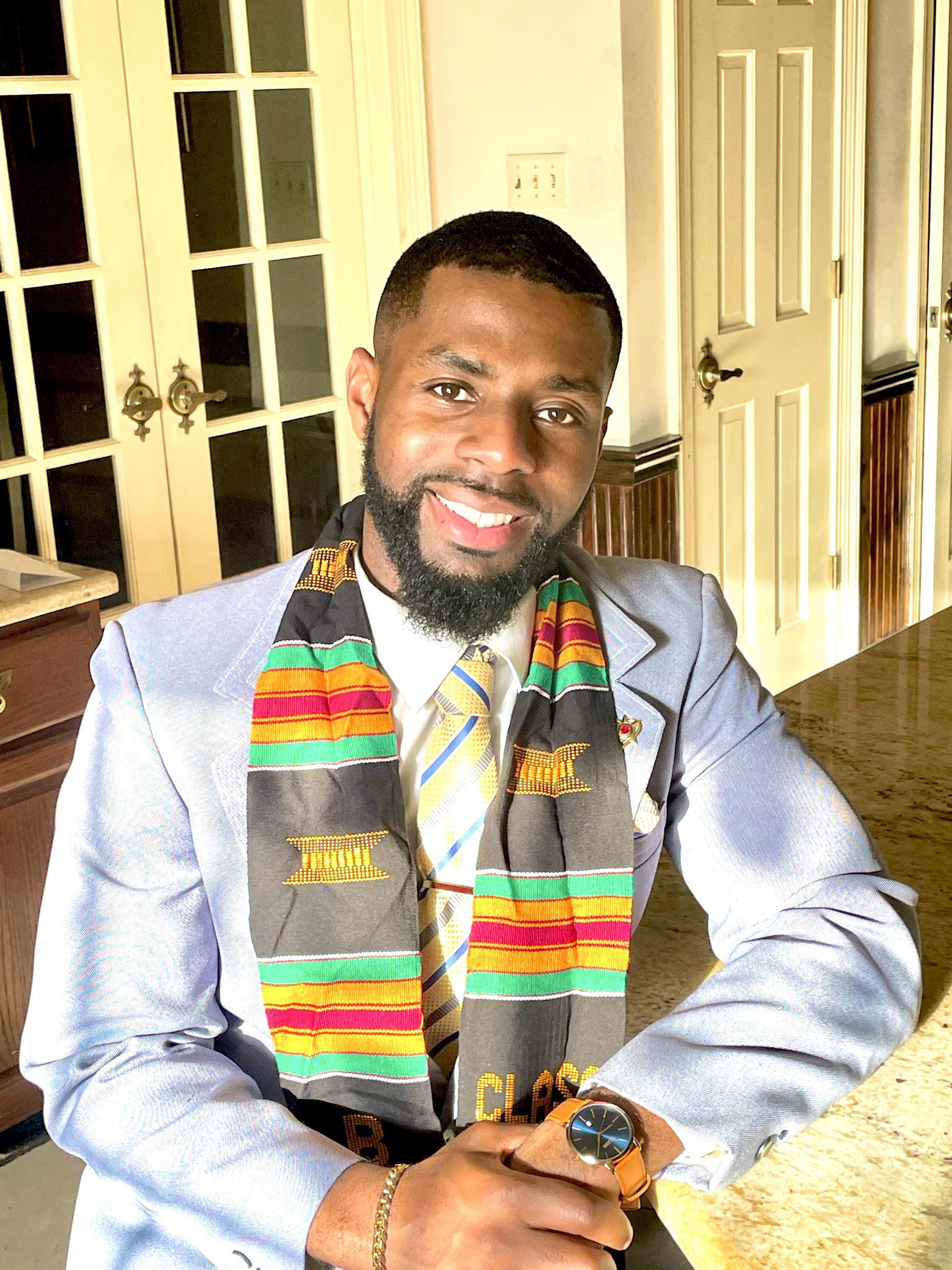
48
GRINDING FORWARD:
Young Alumnus Invests in Future of Multicultural Student Life
When Chima Onwuka (‘17) graduated from the University of Tennessee, he knew it would be just a matter of time until he was able to give back to his alma mater. Those dreams came true this fall with the initial deposit toward a fully-funded endowment, the Grind City Cares Onwuka Fund.
Together with his wife, Monica Onwuka (‘16, ‘21), the couple has committed to giving or raising $25,000 to support the programming and students involved in Multicultural Student Life. This office is responsible for advising several culturallybased and special interest student organizations, providing opportunities for engagement and dialogue through various programs and initiatives, and helping foster leadership and community among students.
As a student, Chima was highly involved, serving as the president of the Volunteer Residence Hall Council, a committee member for the Campus Entertainment Board and Volapalooza, and a member of both the Black Cultural Programming Committee and the National Society of Leadership and Success. Chima was also awarded a service medallion presented to students with 100 or more confirmed service hours.
The Onwukas presented a check for the initial gift toward the endowment at 2023’s Stompfest during Homecoming, a signature event hosted by Multicultural Student Life that many alumni return to attend.
While Multicultural Student Life has been the recipient of other gift funds, Chima represents the
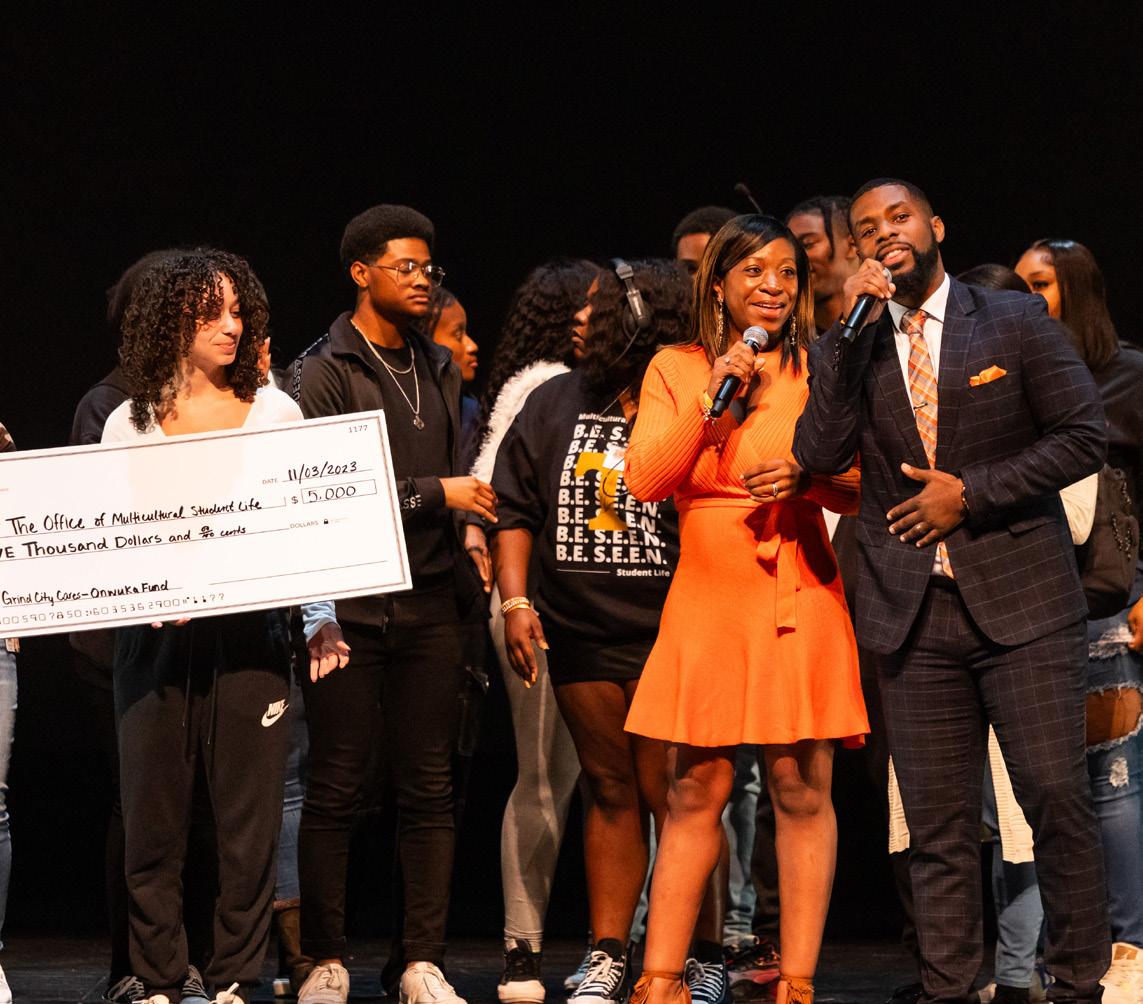
After studying psychology, Chima founded Grind City Cares, a community nonprofit organization, and Grind City Kicks, an online shoe and apparel brand.
Being a Volunteer was a transformational experience for the Onwukas. With their success, they wanted to provide financial opportunities for students who had a similar campus experience to Chima’s own, being actively involved on campus but also possessing a passion for service.
youngest alumni to give back. He also hopes that his gift will compel other young alumni to pour back into the university that invested so much in them.
The gift funds will support programming efforts through the office but will also be available as scholarships or financial assistance for students in need.
PRIORITY 4
49
Chima and Monica Onwuka present their initial gift via check at fall’s Homecoming Stompfest event, hosted by Multicultural Student Life
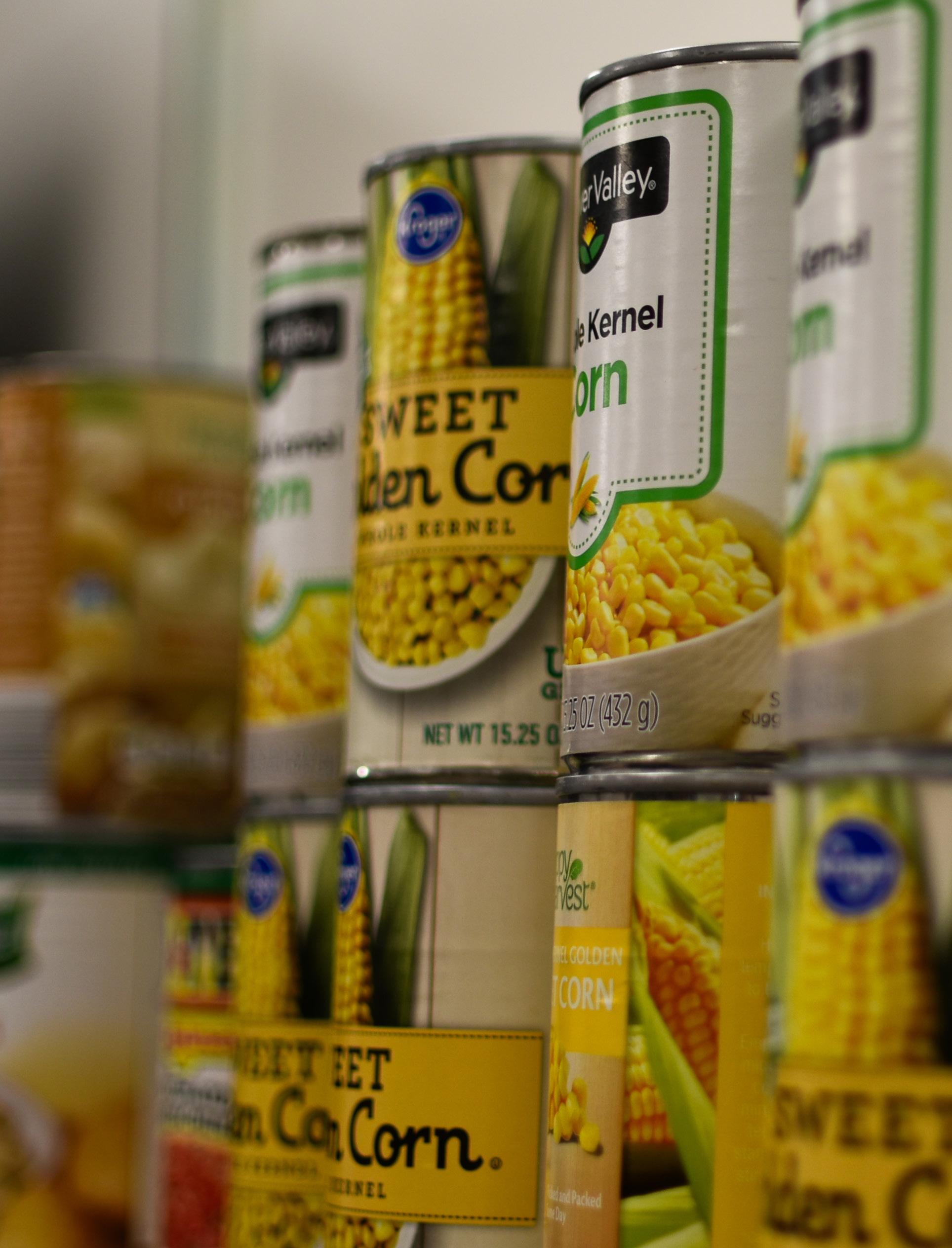
“Working with Basic Needs has allowed me to grow my leadership skills and learn more skills related to my major.”
—Anthony de leon Matta


50
“ ”

STUDENT EMPLOYMENT EXPERIENCE WITH BASIC NEEDS LEADS TO NEW SKILLS
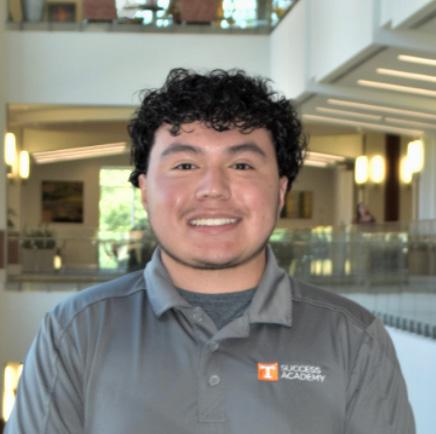 Anthony de leon Matta, Student Director, Big Orange Pantry
Anthony de leon Matta, Student Director, Big Orange Pantry
One of the key components of Student Life’s strategic plan is to responsibly and creatively steward university resources to maximize the student experience and subsequent student learning. Through the Big Orange Pantry, Student Life stewards space, funds, community partnerships, and resources to help reduce food insecurity among the student body, contributing to a basic human need being met more frequently and overall student success. Supporting student success means prioritizing the whole student experience, including access to basic needs.
Read about one Big Orange Pantry student director’s experience serving with the pantry and his perspective on how UT is working to meet students where they are.
As a student director, I have been able to experience the many sides of providing basic needs resources for the campus community, from managing Second Harvest pickup orders and receiving food recovery deliveries to stocking the pantry shelves and greeting people as they come into the space.
Through working here, I have been able to learn more about the reality of basic needs resources. Basic needs challenges, such as hunger, affect more college-aged students than people may initially realize. However, from the perspective of a college student, this makes perfect sense. Students sometimes have to choose between working a job or spending time studying and preparing for exams. With this in mind, students may have limited resources when it comes to feeding themselves. Campus resources like the Big Orange Pantry are a huge help in making sure students at UT are taking care of their basic needs.
Another important realization I have had while working here is the importance of creating a welcoming environment and atmosphere. At the Big Orange Pantry, we try to make the space resemble a regular grocery store as much as possible, whether it’s through the self-shop, the self-checkout experience, or how items are shelved. Playing music and maintaining a vibrant environment is also key to creating a normalized experience for pantry users.
I am very grateful for the opportunity to work here, as it has allowed me to grow my leadership skills and learn more skills related to my major, which is business analytics with a data science minor. Over the summer, I noticed how much data we were collecting about pantry users, and I asked if I could look through it to see if there were any key insights lying around. By analyzing the Big Orange Pantry data, I used this opportunity to build on my existing data visualization skills and learn new ones as well.
This project allowed our team to confirm one of our initial assumptions—graduate students make up over half of pantry users. Overall, this project allowed me to combine the skills I have learned in class with the basic needs insight that I have gained on this job, leading to identifying key data points and visualizations about pantry usage.
As an aspiring business analyst, being able to use my skills in a space that I am passionate about inspires me to learn more skills to further help my community. This summer, I will be interning with PepsiCo as a business analyst in Purchase, New York. My experience as a basic needs student director helped me demonstrate my leadership skills and desire to learn new skills in the interview process for the internship. I look forward to expanding my skillset this summer and returning in the fall to another great semester with the Basic Needs team!
Anthony de leon Matta is a junior. He has worked in the Big Orange Pantry for one semester and will continue his employment in the spring and fall of 2024.
PRIORITY 4 51
LENDING A DIGITAL PAW
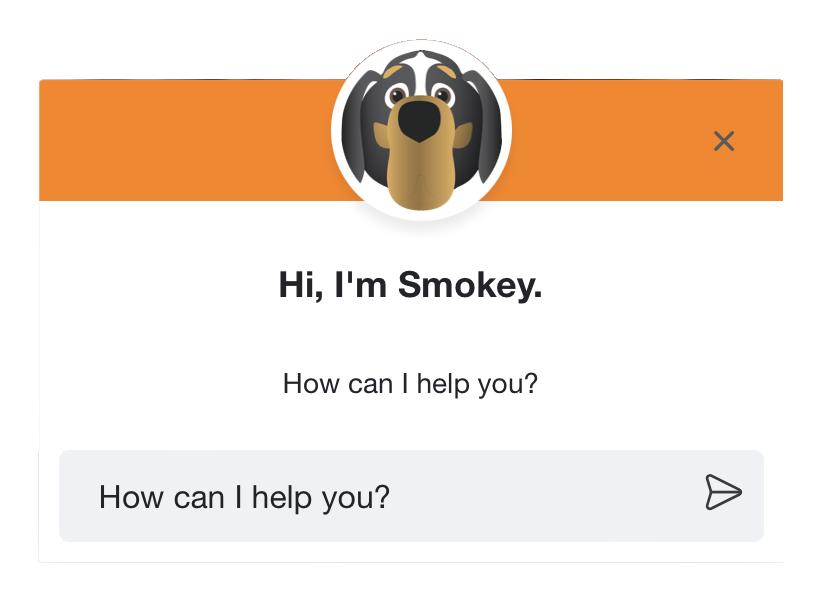
52
A NEW VIRTUAL VERSION OF SMOKEY IS HELPING STUDENTS GET ANSWERS, FAST
“Hi I’m Smokey, and I’m here to help!”
In the corner of each page of the Big Orange Tix website, a cheerful virtual assistant— modeled after Tennessee’s beloved mascot— greets students, ready to assist with inquiries about student ticketing. The virtual assistant, affectionately referred to as Smokey bot, responds to student inquiries 24/7, including nights and weekends outside of conventional business hours when the Big Orange Tix team would otherwise be responsive.
Since its launch on October 10 through the end of the calendar year, the Smokey chatbot engaged in 800 conversations, catering to students, staff, and stakeholders. Smokey was introduced to streamline the multi-step process of securing student tickets for football and basketball games, available for assistance at any hour.
When Smokey is asked a question, the bot crawls every page of the Big Orange Tix website, then Smokey meticulously catalogs information and offers AI-generated responses from the website content. Smokey also includes tailored responses curated by the Student Life Communications team to address the most common queries and concerns.
Leveraging artificial intelligence, Smokey interprets questions and responds to student queries with easily understandable information. Students can work through a flow of common questions and issues or type their specific problem right into the chat bar to start finding their way to answers. Even when Smokey can’t offer a solution, it seamlessly directs students to a help form within the chat box, swiftly sent to the Big Orange Tix team for troubleshooting.
Since launching the Smokey bot, the Big Orange Tix team has seen a reduction in help tickets, especially concerning easily solvable issues like explaining the steps to download a ticket onto a mobile wallet or becoming a group leader for ticketed events. More significantly, Smokey offers real-time insights derived from student queries, empowering the team to identify communication gaps and areas where website updates might be needed. By tracking question trends, peak days and times of inquiries, common issues, and persistent areas of confusion, Smokey plays a pivotal role in refining communication and processes around student ticketing.
“The neat thing about AI, in our case the Smokey Bot, is that it’s sort of like a 24-hour librarian,” says Joe Gray, director of technology services for Student Life. “Students have questions, but may not know exactly where to look for the answer. The bot can instantly access all the information from every website it has indexed, so it can provide a probable best response to the question. Then, it can point students to web pages with the information that they need. And it does so 24/7/365.”
Enhancing communications and processes through the Smokey bot data means ensuring students can fully engage in the activities they enjoy most. The utilization of Smokey for Big Orange Tix has not only been promising for ticketing but also highlights the potential for this virtual assistant to be an asset across various Student Life departments in the future. So, expect to encounter this bouncing, ever-helpful virtual assistant in more areas, ready to assist and support your needs.
PRIORITY 4 53
|
|
700 Andy Holt Tower, Knoxville, TN
37996
studentlife@utk.edu
studentlife.utk.edu



 Frank Cuevas Vice Chancellor for Student Life
Frank Cuevas Vice Chancellor for Student Life
 Byron Hughes Assistant Vice Chancellor and Dean of Students
Byron Hughes Assistant Vice Chancellor and Dean of Students







 Hailey Flavin
Assistant Director, Office of Sorority and Fraternity Life
Hailey Flavin
Assistant Director, Office of Sorority and Fraternity Life


















































 Anthony de leon Matta, Student Director, Big Orange Pantry
Anthony de leon Matta, Student Director, Big Orange Pantry
